HOW TO WRITE A HIGH SCORING KCSE COMPOSITION-IDIOMATIC EXPRESSIONS AND PHRASES
IDIOMATIC EXPRESSIONS AND PHRASES
The following are some of expressions which a candidate can use in writing compositions under the following:-
1.The express sadness, confusion or terrifying moments.
-Scared half to death……….
-That was the time hell broke loose…….. -A cry of horror escaped me at the sight of ………
-Anger blocked my throat……….
-A chill ran down my spine……….
-Eyes were as red as berries……….
-Fight tooth and nail……
2.THE EXPRESS JOY.
-The joy I had knew no bounds………
-Build castles in the air………..
-Tears of joy rolled down my cheeks……….
-I jumped in ecstasy………….
-The vibrant smile on the face expressed incredulous joy………
-Crowd applauded thunderously………….
-I walked tall……….
-Ripped of joy filled my heart………..
-Wild cheers rent the air.
-Everyone was dressed to kill and looked gorgeous
-Smiled broadly exposing their egg – shell white teeth.
-The bride and the bridegroom exchanged vows as the congregation cheered thunderously.
-The maids and the flower girls were beautifully dressed and they looked spick and span.
-The bride swayed her lips left to right, her beautiful dress sweeping the floor.
-My teeth rattled as my feet buckled at the sight of ……… -Felt a strong grip on my neck followed by a smack.
-They were armed to the teeth like soldier in a battle field.
-Victims were frog – marched to the police car and driven away at a terrific speed.
-The man had a protuberant stomach, thick mustache and eyes as red as berries.
-My heart palpitated as I waited anxiously -The thieves were apprehended by the police.
-I heaved a sigh of relief.
-We helplessly fought the raging fire without success.
-The charred remains were taken to the morgue.
-Thousands of sparks nose making the sky look like a huge glistering city.
-Tongues of fire roared like an angry monster.
-The buildings were reduced to ashes. Scores of fire victims lay groaning in pain and agony.
-The fierce fire spread rapidly.
-Thick smoke billowed from the burning house.
-Thick clouds of smoke formed up in the sky.

6.ACCIDENTS
-The injured writhed and groaned in pain and agony.
-The vehicle was reduced to nothing but a mangled wreck.
-Heard a screeching of breaks……..
-Searing pain stubbed their nerves.
-Sombre mood engulfed the onlookers.
-Some flying debris got lodged into my………
-Glass shattered and few pieces found their way into my eyes.
-The blast lifted the bus off the ground, sending passengers flying in all directions.
-Bled profusely at the rate of a leaking pot……..
-To lose heart
-To throw dust in the eye.
-To live from hand to mouth
-To show a white flag
-Thick in the head
-A red letter day
-To take a French leave
-Make a mountain out of an anthill
-To smell a rat
-To turn tables
-To bury the hatchet -To sweep the board
-The lion’s share
-Golden voice
-To make both ends meet
-As ugly as a scarecrow
-As honest as a mirror
-As heavy as lead
-As stupid as a pot
-As harsh as truth
-As humble as a worm
It should be noted that it would be very difficult to use all the given vocabularies in one composition. Never the less, learners should aim at using as many vocabularies as possible. A leaner could be asked to write a second composition on the same theme after some time but this time instructed to use different vocabularies from the ones used in the first composition. This would encourage creativity as there are different ways carrying out a task, composition writing being one of them.
CHOICE OF COMPOSITION THEME
These are some of the themes one can write on when given an open composition. It is however important to make sure that whatever you write on is smoothly connected with the beginning of a composition given. For example
The day I had been waiting for finally arrived. I woke up excited looking forward to the interesting day ahead that was to be spent in a game park ……………..(one then writes on a visit to the game park)
The day I had been waiting for finally arrived. I woke up excited almost not believing that I was going to be involved in my cousin’s wedding…………( then one writes about a wedding ceremony)
The day I had been waiting for finally arrived. I woke up excited and prepared myself quickly so as not be left by the school bus that was to take us to Nakuru Agricultural show………….( then one writes about a visit to the agricultural show)
The day I had been waiting for finally arrived. I woke up excited . I was eager to accompany my parents to the supermarket to purchase goods to take to my grandmother…….( then one writes on a visit to the supermarket or shopping)
The day I had been waiting for finally arrived. I woke up excited, little did I know that I was to witness one of the most serious accidents in our area………….( Then one writes about an accident)
It should be noted that even for guided composition a candidate can still choose to write on a different topic so long as it is smoothly changed at the beginning. A candidate could for instance decide to approach the composition as follows
We lined up on both sides of the road from the school gate ready to welcome a Member of Parliament (MP). It was a school prize giving day ……. However little did we know that the occasion was never to be. We had waited for two hours when suddenly it begun to rain heavily………………………………….( Thenone can write about an accident during the rains, adventure of going home late after the rains, going shopping after the MP failed to come among many other themes one can think about.
Download More Revision Questions and Answers in pdf:
- How To Write Effective KCSE English Paper 3 Essays
- High School KCSE Syllabus Form 1 2 3 and 4-All Subjects
- Murangá High School- Boys
- Kenya High Mocks 2022
- Benefits of High School Software in Kenya
- Maranda High September 2022 Mocks Free Marking Scheme
OR MPESA BuyGoods Till: 858 39 54
Contact 0726568677 || 0728407013
Clicking "Pay Now" is better and automatic

How it works
Transform your enterprise with the scalable mindsets, skills, & behavior change that drive performance.
Explore how BetterUp connects to your core business systems.
We pair AI with the latest in human-centered coaching to drive powerful, lasting learning and behavior change.
Build leaders that accelerate team performance and engagement.
Unlock performance potential at scale with AI-powered curated growth journeys.
Build resilience, well-being and agility to drive performance across your entire enterprise.
Transform your business, starting with your sales leaders.
Unlock business impact from the top with executive coaching.
Foster a culture of inclusion and belonging.
Accelerate the performance and potential of your agencies and employees.
See how innovative organizations use BetterUp to build a thriving workforce.
Discover how BetterUp measurably impacts key business outcomes for organizations like yours.
A demo is the first step to transforming your business. Meet with us to develop a plan for attaining your goals.

- What is coaching?
Learn how 1:1 coaching works, who its for, and if it's right for you.
Accelerate your personal and professional growth with the expert guidance of a BetterUp Coach.
Types of Coaching
Navigate career transitions, accelerate your professional growth, and achieve your career goals with expert coaching.
Enhance your communication skills for better personal and professional relationships, with tailored coaching that focuses on your needs.
Find balance, resilience, and well-being in all areas of your life with holistic coaching designed to empower you.
Discover your perfect match : Take our 5-minute assessment and let us pair you with one of our top Coaches tailored just for you.

Research, expert insights, and resources to develop courageous leaders within your organization.
Best practices, research, and tools to fuel individual and business growth.
View on-demand BetterUp events and learn about upcoming live discussions.
The latest insights and ideas for building a high-performing workplace.
- BetterUp Briefing
The online magazine that helps you understand tomorrow's workforce trends, today.
Innovative research featured in peer-reviewed journals, press, and more.
Founded in 2022 to deepen the understanding of the intersection of well-being, purpose, and performance
We're on a mission to help everyone live with clarity, purpose, and passion.
Join us and create impactful change.
Read the buzz about BetterUp.
Meet the leadership that's passionate about empowering your workforce.

For Business
For Individuals
How to write a speech that your audience remembers

Whether in a work meeting or at an investor panel, you might give a speech at some point. And no matter how excited you are about the opportunity, the experience can be nerve-wracking .
But feeling butterflies doesn’t mean you can’t give a great speech. With the proper preparation and a clear outline, apprehensive public speakers and natural wordsmiths alike can write and present a compelling message. Here’s how to write a good speech you’ll be proud to deliver.
What is good speech writing?
Good speech writing is the art of crafting words and ideas into a compelling, coherent, and memorable message that resonates with the audience. Here are some key elements of great speech writing:
- It begins with clearly understanding the speech's purpose and the audience it seeks to engage.
- A well-written speech clearly conveys its central message, ensuring that the audience understands and retains the key points.
- It is structured thoughtfully, with a captivating opening, a well-organized body, and a conclusion that reinforces the main message.
- Good speech writing embraces the power of engaging content, weaving in stories, examples, and relatable anecdotes to connect with the audience on both intellectual and emotional levels.
Ultimately, it is the combination of these elements, along with the authenticity and delivery of the speaker , that transforms words on a page into a powerful and impactful spoken narrative.
What makes a good speech?
A great speech includes several key qualities, but three fundamental elements make a speech truly effective:
Clarity and purpose
Remembering the audience, cohesive structure.
While other important factors make a speech a home run, these three elements are essential for writing an effective speech.
The main elements of a good speech
The main elements of a speech typically include:
- Introduction: The introduction sets the stage for your speech and grabs the audience's attention. It should include a hook or attention-grabbing opening, introduce the topic, and provide an overview of what will be covered.
- Opening/captivating statement: This is a strong statement that immediately engages the audience and creates curiosity about the speech topics.
- Thesis statement/central idea: The thesis statement or central idea is a concise statement that summarizes the main point or argument of your speech. It serves as a roadmap for the audience to understand what your speech is about.
- Body: The body of the speech is where you elaborate on your main points or arguments. Each point is typically supported by evidence, examples, statistics, or anecdotes. The body should be organized logically and coherently, with smooth transitions between the main points.
- Supporting evidence: This includes facts, data, research findings, expert opinions, or personal stories that support and strengthen your main points. Well-chosen and credible evidence enhances the persuasive power of your speech.
- Transitions: Transitions are phrases or statements that connect different parts of your speech, guiding the audience from one idea to the next. Effective transitions signal the shifts in topics or ideas and help maintain a smooth flow throughout the speech.
- Counterarguments and rebuttals (if applicable): If your speech involves addressing opposing viewpoints or counterarguments, you should acknowledge and address them. Presenting counterarguments makes your speech more persuasive and demonstrates critical thinking.
- Conclusion: The conclusion is the final part of your speech and should bring your message to a satisfying close. Summarize your main points, restate your thesis statement, and leave the audience with a memorable closing thought or call to action.
- Closing statement: This is the final statement that leaves a lasting impression and reinforces the main message of your speech. It can be a call to action, a thought-provoking question, a powerful quote, or a memorable anecdote.
- Delivery and presentation: How you deliver your speech is also an essential element to consider. Pay attention to your tone, body language, eye contact , voice modulation, and timing. Practice and rehearse your speech, and try using the 7-38-55 rule to ensure confident and effective delivery.
While the order and emphasis of these elements may vary depending on the type of speech and audience, these elements provide a framework for organizing and delivering a successful speech.

How to structure a good speech
You know what message you want to transmit, who you’re delivering it to, and even how you want to say it. But you need to know how to start, develop, and close a speech before writing it.
Think of a speech like an essay. It should have an introduction, conclusion, and body sections in between. This places ideas in a logical order that the audience can better understand and follow them. Learning how to make a speech with an outline gives your storytelling the scaffolding it needs to get its point across.
Here’s a general speech structure to guide your writing process:
- Explanation 1
- Explanation 2
- Explanation 3
How to write a compelling speech opener
Some research shows that engaged audiences pay attention for only 15 to 20 minutes at a time. Other estimates are even lower, citing that people stop listening intently in fewer than 10 minutes . If you make a good first impression at the beginning of your speech, you have a better chance of interesting your audience through the middle when attention spans fade.
Implementing the INTRO model can help grab and keep your audience’s attention as soon as you start speaking. This acronym stands for interest, need, timing, roadmap, and objectives, and it represents the key points you should hit in an opening.
Here’s what to include for each of these points:
- Interest : Introduce yourself or your topic concisely and speak with confidence . Write a compelling opening statement using relevant data or an anecdote that the audience can relate to.
- Needs : The audience is listening to you because they have something to learn. If you’re pitching a new app idea to a panel of investors, those potential partners want to discover more about your product and what they can earn from it. Read the room and gently remind them of the purpose of your speech.
- Timing : When appropriate, let your audience know how long you’ll speak. This lets listeners set expectations and keep tabs on their own attention span. If a weary audience member knows you’ll talk for 40 minutes, they can better manage their energy as that time goes on.
- Routemap : Give a brief overview of the three main points you’ll cover in your speech. If an audience member’s attention starts to drop off and they miss a few sentences, they can more easily get their bearings if they know the general outline of the presentation.
- Objectives : Tell the audience what you hope to achieve, encouraging them to listen to the end for the payout.
Writing the middle of a speech
The body of your speech is the most information-dense section. Facts, visual aids, PowerPoints — all this information meets an audience with a waning attention span. Sticking to the speech structure gives your message focus and keeps you from going off track, making everything you say as useful as possible.
Limit the middle of your speech to three points, and support them with no more than three explanations. Following this model organizes your thoughts and prevents you from offering more information than the audience can retain.
Using this section of the speech to make your presentation interactive can add interest and engage your audience. Try including a video or demonstration to break the monotony. A quick poll or survey also keeps the audience on their toes.
Wrapping the speech up
To you, restating your points at the end can feel repetitive and dull. You’ve practiced countless times and heard it all before. But repetition aids memory and learning , helping your audience retain what you’ve told them. Use your speech’s conclusion to summarize the main points with a few short sentences.
Try to end on a memorable note, like posing a motivational quote or a thoughtful question the audience can contemplate once they leave. In proposal or pitch-style speeches, consider landing on a call to action (CTA) that invites your audience to take the next step.

How to write a good speech
If public speaking gives you the jitters, you’re not alone. Roughly 80% of the population feels nervous before giving a speech, and another 10% percent experiences intense anxiety and sometimes even panic.
The fear of failure can cause procrastination and can cause you to put off your speechwriting process until the last minute. Finding the right words takes time and preparation, and if you’re already feeling nervous, starting from a blank page might seem even harder.
But putting in the effort despite your stress is worth it. Presenting a speech you worked hard on fosters authenticity and connects you to the subject matter, which can help your audience understand your points better. Human connection is all about honesty and vulnerability, and if you want to connect to the people you’re speaking to, they should see that in you.
1. Identify your objectives and target audience
Before diving into the writing process, find healthy coping strategies to help you stop worrying . Then you can define your speech’s purpose, think about your target audience, and start identifying your objectives. Here are some questions to ask yourself and ground your thinking :
- What purpose do I want my speech to achieve?
- What would it mean to me if I achieved the speech’s purpose?
- What audience am I writing for?
- What do I know about my audience?
- What values do I want to transmit?
- If the audience remembers one take-home message, what should it be?
- What do I want my audience to feel, think, or do after I finish speaking?
- What parts of my message could be confusing and require further explanation?
2. Know your audience
Understanding your audience is crucial for tailoring your speech effectively. Consider the demographics of your audience, their interests, and their expectations. For instance, if you're addressing a group of healthcare professionals, you'll want to use medical terminology and data that resonate with them. Conversely, if your audience is a group of young students, you'd adjust your content to be more relatable to their experiences and interests.
3. Choose a clear message
Your message should be the central idea that you want your audience to take away from your speech. Let's say you're giving a speech on climate change. Your clear message might be something like, "Individual actions can make a significant impact on mitigating climate change." Throughout your speech, all your points and examples should support this central message, reinforcing it for your audience.
4. Structure your speech
Organizing your speech properly keeps your audience engaged and helps them follow your ideas. The introduction should grab your audience's attention and introduce the topic. For example, if you're discussing space exploration, you could start with a fascinating fact about a recent space mission. In the body, you'd present your main points logically, such as the history of space exploration, its scientific significance, and future prospects. Finally, in the conclusion, you'd summarize your key points and reiterate the importance of space exploration in advancing human knowledge.
5. Use engaging content for clarity
Engaging content includes stories, anecdotes, statistics, and examples that illustrate your main points. For instance, if you're giving a speech about the importance of reading, you might share a personal story about how a particular book changed your perspective. You could also include statistics on the benefits of reading, such as improved cognitive abilities and empathy.
6. Maintain clarity and simplicity
It's essential to communicate your ideas clearly. Avoid using overly technical jargon or complex language that might confuse your audience. For example, if you're discussing a medical breakthrough with a non-medical audience, explain complex terms in simple, understandable language.
7. Practice and rehearse
Practice is key to delivering a great speech. Rehearse multiple times to refine your delivery, timing, and tone. Consider using a mirror or recording yourself to observe your body language and gestures. For instance, if you're giving a motivational speech, practice your gestures and expressions to convey enthusiasm and confidence.
8. Consider nonverbal communication
Your body language, tone of voice, and gestures should align with your message . If you're delivering a speech on leadership, maintain strong eye contact to convey authority and connection with your audience. A steady pace and varied tone can also enhance your speech's impact.
9. Engage your audience
Engaging your audience keeps them interested and attentive. Encourage interaction by asking thought-provoking questions or sharing relatable anecdotes. If you're giving a speech on teamwork, ask the audience to recall a time when teamwork led to a successful outcome, fostering engagement and connection.
10. Prepare for Q&A
Anticipate potential questions or objections your audience might have and prepare concise, well-informed responses. If you're delivering a speech on a controversial topic, such as healthcare reform, be ready to address common concerns, like the impact on healthcare costs or access to services, during the Q&A session.
By following these steps and incorporating examples that align with your specific speech topic and purpose, you can craft and deliver a compelling and impactful speech that resonates with your audience.

Tools for writing a great speech
There are several helpful tools available for speechwriting, both technological and communication-related. Here are a few examples:
- Word processing software: Tools like Microsoft Word, Google Docs, or other word processors provide a user-friendly environment for writing and editing speeches. They offer features like spell-checking, grammar correction, formatting options, and easy revision tracking.
- Presentation software: Software such as Microsoft PowerPoint or Google Slides is useful when creating visual aids to accompany your speech. These tools allow you to create engaging slideshows with text, images, charts, and videos to enhance your presentation.
- Speechwriting Templates: Online platforms or software offer pre-designed templates specifically for speechwriting. These templates provide guidance on structuring your speech and may include prompts for different sections like introductions, main points, and conclusions.
- Rhetorical devices and figures of speech: Rhetorical tools such as metaphors, similes, alliteration, and parallelism can add impact and persuasion to your speech. Resources like books, websites, or academic papers detailing various rhetorical devices can help you incorporate them effectively.
- Speechwriting apps: Mobile apps designed specifically for speechwriting can be helpful in organizing your thoughts, creating outlines, and composing a speech. These apps often provide features like voice recording, note-taking, and virtual prompts to keep you on track.
- Grammar and style checkers: Online tools or plugins like Grammarly or Hemingway Editor help improve the clarity and readability of your speech by checking for grammar, spelling, and style errors. They provide suggestions for sentence structure, word choice, and overall tone.
- Thesaurus and dictionary: Online or offline resources such as thesauruses and dictionaries help expand your vocabulary and find alternative words or phrases to express your ideas more effectively. They can also clarify meanings or provide context for unfamiliar terms.
- Online speechwriting communities: Joining online forums or communities focused on speechwriting can be beneficial for getting feedback, sharing ideas, and learning from experienced speechwriters. It's an opportunity to connect with like-minded individuals and improve your public speaking skills through collaboration.
Remember, while these tools can assist in the speechwriting process, it's essential to use them thoughtfully and adapt them to your specific needs and style. The most important aspect of speechwriting remains the creativity, authenticity, and connection with your audience that you bring to your speech.

5 tips for writing a speech
Behind every great speech is an excellent idea and a speaker who refined it. But a successful speech is about more than the initial words on the page, and there are a few more things you can do to help it land.
Here are five more tips for writing and practicing your speech:
1. Structure first, write second
If you start the writing process before organizing your thoughts, you may have to re-order, cut, and scrap the sentences you worked hard on. Save yourself some time by using a speech structure, like the one above, to order your talking points first. This can also help you identify unclear points or moments that disrupt your flow.
2. Do your homework
Data strengthens your argument with a scientific edge. Research your topic with an eye for attention-grabbing statistics, or look for findings you can use to support each point. If you’re pitching a product or service, pull information from company metrics that demonstrate past or potential successes.
Audience members will likely have questions, so learn all talking points inside and out. If you tell investors that your product will provide 12% returns, for example, come prepared with projections that support that statement.
3. Sound like yourself
Memorable speakers have distinct voices. Think of Martin Luther King Jr’s urgent, inspiring timbre or Oprah’s empathetic, personal tone . Establish your voice — one that aligns with your personality and values — and stick with it. If you’re a motivational speaker, keep your tone upbeat to inspire your audience . If you’re the CEO of a startup, try sounding assured but approachable.
4. Practice
As you practice a speech, you become more confident , gain a better handle on the material, and learn the outline so well that unexpected questions are less likely to trip you up. Practice in front of a colleague or friend for honest feedback about what you could change, and speak in front of the mirror to tweak your nonverbal communication and body language .
5. Remember to breathe
When you’re stressed, you breathe more rapidly . It can be challenging to talk normally when you can’t regulate your breath. Before your presentation, try some mindful breathing exercises so that when the day comes, you already have strategies that will calm you down and remain present . This can also help you control your voice and avoid speaking too quickly.
How to ghostwrite a great speech for someone else
Ghostwriting a speech requires a unique set of skills, as you're essentially writing a piece that will be delivered by someone else. Here are some tips on how to effectively ghostwrite a speech:
- Understand the speaker's voice and style : Begin by thoroughly understanding the speaker's personality, speaking style, and preferences. This includes their tone, humor, and any personal anecdotes they may want to include.
- Interview the speaker : Have a detailed conversation with the speaker to gather information about their speech's purpose, target audience, key messages, and any specific points they want to emphasize. Ask for personal stories or examples they may want to include.
- Research thoroughly : Research the topic to ensure you have a strong foundation of knowledge. This helps you craft a well-informed and credible speech.
- Create an outline : Develop a clear outline that includes the introduction, main points, supporting evidence, and a conclusion. Share this outline with the speaker for their input and approval.
- Write in the speaker's voice : While crafting the speech, maintain the speaker's voice and style. Use language and phrasing that feel natural to them. If they have a particular way of expressing ideas, incorporate that into the speech.
- Craft a captivating opening : Begin the speech with a compelling opening that grabs the audience's attention. This could be a relevant quote, an interesting fact, a personal anecdote, or a thought-provoking question.
- Organize content logically : Ensure the speech flows logically, with each point building on the previous one. Use transitions to guide the audience from one idea to the next smoothly.
- Incorporate engaging stories and examples : Include anecdotes, stories, and real-life examples that illustrate key points and make the speech relatable and memorable.
- Edit and revise : Edit the speech carefully for clarity, grammar, and coherence. Ensure the speech is the right length and aligns with the speaker's time constraints.
- Seek feedback : Share drafts of the speech with the speaker for their feedback and revisions. They may have specific changes or additions they'd like to make.
- Practice delivery : If possible, work with the speaker on their delivery. Practice the speech together, allowing the speaker to become familiar with the content and your writing style.
- Maintain confidentiality : As a ghostwriter, it's essential to respect the confidentiality and anonymity of the work. Do not disclose that you wrote the speech unless you have the speaker's permission to do so.
- Be flexible : Be open to making changes and revisions as per the speaker's preferences. Your goal is to make them look good and effectively convey their message.
- Meet deadlines : Stick to agreed-upon deadlines for drafts and revisions. Punctuality and reliability are essential in ghostwriting.
- Provide support : Support the speaker during their preparation and rehearsal process. This can include helping with cue cards, speech notes, or any other materials they need.
Remember that successful ghostwriting is about capturing the essence of the speaker while delivering a well-structured and engaging speech. Collaboration, communication, and adaptability are key to achieving this.
Give your best speech yet
Learn how to make a speech that’ll hold an audience’s attention by structuring your thoughts and practicing frequently. Put the effort into writing and preparing your content, and aim to improve your breathing, eye contact , and body language as you practice. The more you work on your speech, the more confident you’ll become.
The energy you invest in writing an effective speech will help your audience remember and connect to every concept. Remember: some life-changing philosophies have come from good speeches, so give your words a chance to resonate with others. You might even change their thinking.
Elevate your communication skills
Unlock the power of clear and persuasive communication. Our coaches can guide you to build strong relationships and succeed in both personal and professional life.
Elizabeth Perry, ACC
Elizabeth Perry is a Coach Community Manager at BetterUp. She uses strategic engagement strategies to cultivate a learning community across a global network of Coaches through in-person and virtual experiences, technology-enabled platforms, and strategic coaching industry partnerships. With over 3 years of coaching experience and a certification in transformative leadership and life coaching from Sofia University, Elizabeth leverages transpersonal psychology expertise to help coaches and clients gain awareness of their behavioral and thought patterns, discover their purpose and passions, and elevate their potential. She is a lifelong student of psychology, personal growth, and human potential as well as an ICF-certified ACC transpersonal life and leadership Coach.
How to write an impactful cover letter for a career change
6 presentation skills and how to improve them, 10+ interpersonal skills at work and ways to develop them, how to be more persuasive: 6 tips for convincing others, the 11 tips that will improve your public speaking skills, self-management skills for a messy world, what is a career statement, and should you write one, a guide on how to find the right mentor for your career, want a leg up in your career master these 11 key listening skills, similar articles, how to write an executive summary in 10 steps, how to pitch ideas: 8 tips to captivate any audience, how to give a good presentation that captivates any audience, anxious about meetings learn how to run a meeting with these 10 tips, writing an elevator pitch about yourself: a how-to plus tips, 9 elevator pitch examples for making a strong first impression, how to make a presentation interactive and exciting, how to write a memo: 8 steps with examples, stay connected with betterup, get our newsletter, event invites, plus product insights and research..
3100 E 5th Street, Suite 350 Austin, TX 78702
- Platform Overview
- Integrations
- Powered by AI
- BetterUp Lead
- BetterUp Manage™
- BetterUp Care™
- Sales Performance
- Diversity & Inclusion
- Case Studies
- Why BetterUp?
- About Coaching
- Find your Coach
- Career Coaching
- Communication Coaching
- Life Coaching
- News and Press
- Leadership Team
- Become a BetterUp Coach
- BetterUp Labs
- Center for Purpose & Performance
- Leadership Training
- Business Coaching
- Contact Support
- Contact Sales
- Privacy Policy
- Acceptable Use Policy
- Trust & Security
- Cookie Preferences
- CPA NEW SYLLABUS 2021
- KCSE MARKING SCHEMES
- ACTS OF PARLIAMENT
- UNIVERSITY RESOURCES PDF
- CPA Study Notes
- INTERNATIONAL STANDARDS IN AUDITING (ISA)
- Teach Yourself Computers
KNEC / TVET CDACC STUDY MATERIALS, REVISION KITS AND PAST PAPERS
Quality and Updated
- FUNCTIONAL WRITING NOTES
FUNCTIONAL WRITING
It refers to those texts that we produce in order to achieve a specific purpose. All writing has purpose. Functional writing is narrowly targeted at a particular reader, from whom we want a definite, practical response. In fact, most writing that most ordinary people do belongs to this category of writing. Pieces of functional writing are intended to fulfil specific needs, like applying for a job, registering to vote, keeping records or publicizing an event.
Types of Functional Writing
Functional writing covers a wide variety of texts. The following are some of the common types of functional writing that you are likely to encounter and be required to undertake in your day to day operations;
- Letters: written messages addressed to specific individuals or organizations
- Memos/Memoranda: official internal notes addressed to members of an organization
- Curriculum vitae (Resume): a summary of one’s education and work experience
- Public notices: written announcements informing or reminding people of an activity
- Minutes: brief records of what is discussed and agreed upon at a meeting
- Reports: accounts of the activities, findings and results of an undertaking or project
- Speeches: written texts of what speakers intend to say to an audience
- Diaries and personal journals: brief records of one’s daily experiences and reflections
- Recipes: guides on how to prepare dishes, listing ingredients and cooking steps
- Forms: printed application, declaration or registration texts prepared to gather information about an individual or an organization.
- Electronic mail and short message service (SMS): electronic letters sent over the internet and mobile telephone networks respectively
Letters can be classified as formal or informal letters.
PARTS OF A LETTER
Whether a letter is formal or informal (business letters, personal business letters and personal letters), they all contain this parts;
- Inside address
FORMAL LETTERS
Formal letters are written for various purposes such as to apply for jobs, extend invitations, convey apologies, make requests or enquiries and register complaints among other uses.
Formal letters can be broadly categorized either as; i) business letters and ii) personal business letters
Business letters are written from one business firm to another or from a business to an individual customer or client. Personal business letters are written by individuals to business firms.
While writing a formal letter, you should include the following:
- Writers’ address which is written on the left hand side at the top corner unless the indent style of paragraphing is preferred
- Date of writing is placed one line below the writers’ address
- The line below the date on the left hand side contains the title of the person to whom the letter is addressed (addressee). Also provide the postal address
- Salutation is placed below the addressee’s address: ‘Dear Sir’ or ‘Dear Madam’ are common salutations
- Subject/Reference/Heading of the letter should appear two lines below the salutation and preferably be written in capital letters and underlined. The subject which should be brief and to the point captures the theme of the letter
- The main body of the letter follows the heading. The letter should have an introductory paragraph which states the objectives of the letter while the following one or two paragraphs develop the letter by providing more details that relate to the purpose of writing the letter. You should make it short and precise. Nevertheless, include the necessary information that will help to convey the message precisely, accurately and concisely.
- Mention the purpose of writing, the job being applied for and where the advert was placed
- State your qualifications and experience clearly
- Indicate why you wish to be given the job
- Show optimism e.g. Looking forward to hear from you
- The complimentary close for instance ‘Yours Faithfully’ closes the letter. If the salutation in the letter is ‘Dear Sir’ or ‘Dear Madam’ then the closing tag should be ‘Your Faithfully’. However, if the letter stated the name of addressee e.g ‘Dear Mrs. Ngugi’ or ‘Dear Mr. Otieno’ the complimentary close should be ‘Yours Sincerely’
- Write your signature
- Your name appears below the signature
INFORMAL LETTERS
Informal letters can be referred to as personal letters which are exchanged by friends and relatives. For this reason there is flexibility in the language used but this doesn’t mean that one becomes impolite or overly casual when writing informal letters. Observe accuracy of the language and avoid grammatical and spelling mistakes.
When writing informal letters note the following:
- Your address is usually on the right hand side at the top corner of the paper. Do not write your name in the address since you will write it in the closing tag. You may use block or indented style in writing the address
- The date is written one line below your address
- Write the salutation on the left hand side stating the name of the addressee e.g. Dear Margret
- The body of the letter contains the main content of the letter: introductory paragraph, main paragraph and conclusion
- Complimentary close is usually ‘Yours Lovingly’ or ‘Yours Sincerely’. Other closing tags are allowed depending on the relationship between you and addressee; one can close for example, ‘Your affectionate son’ or ‘Your loving daughter’ etc
- Write your name as you close the letter on same side as your address i.e. right side
MEMORANDA/MEMOS/MEMORANDUM
Memo means ‘note to assist memory’. Memos are used for internal communication purposes only. For that reason, memos provide a rapid and convenient means of communication between members of the organization; could be between executives and subordinates or officers of the same level. Although memo styles differ widely from company to company they basically consist of a heading and a body. An internal memo has the following features:
- Name of the person sending out the memo.
- Name of the person(s) the memo is being sent to.
- Reference number (optional).
- Subject (information heading).
- Body- for brief information- not detailed communication.
- Sender’s signature or initials—at the bottom of the main text.
Functions/Purpose of Memos
Memos serve a variety of purposes such as;
- To issue instructions to staff.
- To communicate decisions and policy changes to staff
- To give or seek suggestions
- To request help or information
- To confirm a decision arrived at on telephone etc.
- To send messages or very brief reports
- Introduce a topic, a person
- Enquire about certain matters/information
- Remind members of an organization any important matters

HOW TO EARN 19-20 MARKS IN A KCSE IMAGINATIVE COMPOSITION
WRITING THE BEST IMAGINATIVE ESSAYS
KCSE ENGLISH IMAGINATIVE COMPOSITION
Have you ever read or written a composition that has the following expressions?
“In two shakes of a lamb’s tail, I dashed to the frog’s kingdom to accuse the dirt …”
“His face was a supermarket/network of pimples” “Two gigantic men kidnapped me …”
“One chilly morning when the birds were chirping and the frogs were croaking …”
Well, as much as some of these expressions may not be grammatically wrong per se, they are clichés that show lack of imagination/creativity and thus will hinder you from scoring a quality mark in KCSE English 101/3 imaginative composition.
This question simply tests your ability to communicate.
Creative writing
According to Wikipedia Creative writing is any writing that goes outside the bounds of normal professional, journalistic , academic , or technical forms of literature, typically identified by an emphasis on narrative craft, character development, and the use of literary tropes or with various traditions of poetry and poetics .
The question tests the candidates’ creativity, originality and ability to communicate in writing.
You should ensure that these objectives are met by the end of the course before your learners attempt English 101/3 tests.
By the end of the course, the learner should be able to:
- writelegiblyandneatly;
- aplyspelingrulesandspelwordscorectly;
- usepunctuationmarkscorectly;
- writeclearandcorectsentences,andorganizeideasinalogical sequence;
- communicateeffectivelyinwriting,usingavarietyofsentence structures;
- developparagraphsusingdifferentdevices;
- usefigurativelanguagecorectlyandapropriately;
- usecohesivedevicesindevelopingparagraphs;
- usepunctuationmarksapropriately,competentlyandcreatively;
- demonstratecompetenceinwritingdifferentypesofesays;
- presentinformationinavarietyofways;
- demonstratecompetenceinusingawiderangeofsentencestructures andvocabularytocreatethedesiredeffect.
Therefore, apart from teaching creative writing (imaginative compositions) which is taught in form 3, teachers should ensure the learners acquire other writing skills as well. These include;
- Handwriting-legibilityandtidines
- Commonlymispeltwords— spelingandspelingrules
c) Sentencebuildingskillsandparagraphing
- i. Writingclearandcorectsentences
- Structureoftheparagraph:topicsentences,suportingsentences, clinchersentences,sequencingofideas,unityinparagraphs.
- Sentencevariety;usingsimple,compoundandcomplexsentences Devicesofdevelopingparagraphs:givingreasons/examples, comparing
andcontrasting,usingidiomaticexpresions,using facts/statisticsand usingrhetoricalquestions.
- C o h e s i o n i n p a r ag r a ph s UsingtransitionalwordsandphrasesChoiceofwordsrecurentwords (differentwordsthatrefertothesameideaintheparagraph)tocreate emphasisParaphrasing.
- P un c t u a t i o n : Capitalization,final/terminalpunctuationmarks, commas,quotationmarks,apostrophe,hyphen,colon,Semi-colon,dash, parenthesis,devicesforpresentingtitlesofpublications,quotationsand headings.
- S t ud y W r i t i n g : Descriptiveesays,Argumentativeesays,Expository writing,
To help your learners perform well in KCSE imaginative composition, you should teach different types of writing and provide them with ample practice. You should also impress upon them that expository composition is concerned with linguistic ability as it is not concerned with the points.
WRITING A+ KCSE IMAGINATIVE COMPOSITIONS
The best KCSE imaginative compositions score between 19-20 marks. Your composition must possess the following in order to fall under this category.
- Intelligibility-able to be understood (comprehensible)
- Correctness
- Accuracy (devoid of errors)
- Fluency (communicates easily/very well/smoothly)
- Pleasantness
- Originality (new and different in a good and appealing way)
NOTE: Linguistic competence carries the most marks in imaginative compositions.
CATEGORIES OF KCSE IMAGINATIVE COMPOSITIONS
The category your essay falls under depends on the degree of communication . Other factors discussed below will determine the specific numerical mark you earn.
- D CLASS: (1-5 MARKS) Guesswork-No communication at all
- C CLASS: (6-10 MARKS) Flat-Weak communication because of strain (lacks fluency)
- B CLASS: (11-15MARKS) Fluent-Ease of communication due to greater fluency
- A CLASS: (16-20MARKS) Pleasant-Captivating, creative, has command of language
HOW TO WRITE AN A-CLASS IMAGINATIVE COMPOSITION
We all want to write pleasant compositions that fall in A CLASS in order to score high marks.
To achieve that, we MUST write compositions that possess the following qualities.
A-CLASS KCSE IMAGINATIVE COMPOSITIONS
- Write fluently and attractively
- Must have originality (new and different)/efficiency
- Make us feel your deep feelings (senses), emotions (strong feelings g. love, fear, anger, bitterness, relief, joy etc), and enthusiasm (strong interest, desires, excitement)
- Should be attractive (pleasant/appealing/interesting)
This falls in the general category of a pleasant composition that score between 16- 20 marks.
This article, however, is meant to help you write a KCSE imaginative composition that will earn between 19-20 marks
In order to achieve this, you must;
- Express yourself freely
- Exhibit no visible constraint
- Exhibit maturity(avoid obscene, suggestive, steamy or graphic description of sexual innuendos or other forms of immorality), good planning, humour (comical/funny)
- Have many items of merit ( correct vocabulary (or jargon-informal language does not score), phrasal verbs, idioms, proverbs, aspects of literary techniques g.
irony, suspense, imagery etc , correct, appealing felicity of expression in whole sentences or paragraphs)
- Show clever arrangement (e.g. flashbacks creating suspense)
- Have felicity of expression (well chosen features in writing/communication)
⚠ ERRORS ERRORS
Avoid the following errors;
- Faulty paragraphing
- Repetition/redundancies (using a word phrase etc that repeats something else and is therefore unnecessary-e.g. bow down, reverse back, colleague teachers, repeat again )
- Illegibility (impossible or hard to read or decipher because of poor handwriting)
- Vagueness (thoughts that are not stated or expressed clearly; in a general and not specific way) Obscurity (unclear, difficult to understand)
- Wrong word order/illogical (lacking sense or clear sound reasoning)or contradictory (inconsistent) statements
- Broken English (e.g. his business has caught down instead of his business is thriving , hunger is biting me, etc)
- Contracted forms (e.g. didn’t instead of did not; NB they may be used in direct speech )
GROSS ERRORS contribute to a lower score and learners whose compositions have the following errors more often than not fail to score over 15 marks in their compositions. Gross errors include;
- Errors of subject-verb agreement
- Serious tense error
- Errors of elementary vocabulary, misuse of vocabulary, wrong spellings of vocabularies (avoid clichés e.g. I ran as fast as my feeble legs could carry me, I took my breakfast in a blink of an eye )
- Punctuation errors e.g. missing punctuation marks (missing final punctuation marks g. full stop is penalized heavily)
- Errors of sentence construction
- Ridiculous use of idioms thus affecting communication
- Misuse of common prepositions
- Misuse of capital letters
TYPES OF KCSE IMAGINATIVE ESSAYS
English 101/3 tests three types of essays;
- Narrative essays: Simply tell a
- Descriptive essays: Paint a picture with
- Expository essays: Just give the facts as per the
Examples of PAST KCSE IMAGINATIVE COMPOSITIONS
KCSE ENGLISH 101/3 IMAGINATIVE COMPOSITION 2018
For composition 1(a) you should write a narrative; 1(b) write a descriptive essay.
KCSE IMAGINATIVE COMPOSITION 2018
KCSE ENGLISH 101/3 IMAGINATIVE COMPOSITION 2017
For composition 1(a) you should write a narrative; 1(b) write an expository essay.
KCSE IMAGINATIVE COMPOSITION 2017
KCSE ENGLISH 101/3 IMAGINATIVE COMPOSITION 2016
KCSE IMAGINATIVE COMPOSITION 2016
KCSE ENGLISH 101/3 IMAGINATIVE COMPOSITION 2015
For composition:
1(a) you should write a narrative; compose a story to illustrate the saying;
1(b) write an expository essay. Simply give facts about what you think should be done to reduce indiscipline in schools (Do not write a story)
KCSE IMAGINATIVE COMPOSITION 2015
KCSE ENGLISH 101/3 IMAGINATIVE COMPOSITION 2014
Your essay should not exceed 450 words (about 3 pages of your KCSE answer booklet). Otherwise you risk losing 2 marks.
However, the quality of an essay depends solely on how effectively it communicates.
AMERICAN SPELLING
American spelling e.g. color, labor, center, meter etc is not penalised. It’s only penalised if there is lack of consistency.
OTHER HELPFUL TIPS
Narrative essays
- Understand the setting of the composition in line with the rubric. If the composition is about a crime scene that informs you about the physical setting of
your story. You do not have to start your story on a chilly morning with chirping birds or taking breakfast. Take us to the scene and give us the events that happen before and possibly after the crime.
- Have a simple, clear storyline with an introduction, climax and
- Have a clear, consistent point of
- Be a character in the Use the first person pronoun “I”
- Use direct speech to give your story ‘life’.
- Develop your characters fully (describe them and make it easy for readers to infer their character traits). Have relateable, realistic
- Evoke emotions in the Create an air of poignancy-painfully affecting the feelings (evoke feelings of sadness, joy, sympathy, anger, bitterness, nostalgia etc). Share your deep feelings.
- Uphold morals and avoid praising
- Tell an original story-new and interesting
- It helps to start your story with direct speech, a poem, a song etc if (only if you have not been instructed to begin with certain words)
- Titles are not necessary since they do not add any value to your However, they may make you lose marks if they contain any errors.
- Build suspense
- Avoid oral narratives ( Once upon a time … or fantasies with ogres in the forest- unless you have ever encountered one or know someone who has). Your essay
SHOULD be creative but realistic.
- Must be a If not you risk losing 4 marks! You DO NOT want to lose four hard earned marks, do you?
- Begin or end with the words provided or else you will lose 2 valuable
- Avoid any errors
- Write legibly and clearly
In brief, simply write a story. Tell a story the way you would when talking to your grandma or your buddies.
There is no fixed format so do not copy story lines from books (e.g. the Bible) and movies- this may expose your lack of creativity. Express yourself freely.
Do not cram a composition and cross your fingers hoping that you get a similar one in KCSE.
Expository essays
For expository compositions, we are not concerned with the points, only the linguistic ability.
- Introduce your essay on the first paragraph, write at least four points in at least four separate paragraphs, and conclude or sum up your essay in the last
- Develop cohesive paragraphs for a smooth flowing Use transitional words to link your paragraphs and sentences.
- A paragraph must introduce the main idea in the topic sentence (the first sentence of each paragraph). The next two or three sentences should add information to support this main Sum up the paragraph with a clincher-a statement which
summarises the paragraph before you introduce a new point.
Descriptive essays
Thedescriptiveessayisagenreofessaythatasksthestudento describesomething—objectperson,place,experience,emotion, situation,etc.Thegoalofwhichistopaintanimagethatisvivid andmovinginthemindofthereader.Thereadershouldclearly formanimpressionofthethingyouaredescribing.
- Brainstorm on the features of the person or thing and write them
- Use simple, clear language
- Use vivid language g. ox instead of cow, tempestuous instead of violent , stallion not horse, bungalow not house
- Appeal to the senses of touch, smell, sight, hearing and Explain how something looks, tastes, smells etc
- Create a clear impression in the reader’s Describe someone or something until I see it.
- Be organised
- Write neatly/legibly
- Avoid errors
SAMPLE KCSE IMAGINATIVE COMPOSITIONS
KCSE IMAGINATIVE COMPOSITION
Mwalimu Wafula Wekati
Writer at: www.wekati.blogspot.com [email protected]
One response to “HOW TO EARN 19-20 MARKS IN A KCSE IMAGINATIVE COMPOSITION”
this was helpful I hope you can upload examples of the essays
Leave a Reply Cancel reply
Your email address will not be published. Required fields are marked *
Save my name, email, and website in this browser for the next time I comment.
TRENDING NOW
- Mwalimu National Sacco launches new loan products
- Revised Entry Requirements For Joining Teachers Training Colleges, TTCs
- Nyakiambi Girls Secondary School’s KCSE Results, KNEC Code, Admissions, Location, Contacts, Fees, Students’ Uniform, History, Directions and KCSE Overall School Grade Count Summary
- Mama Lucy Hospital latest news on changes in management
boot mieten chalkidiki

- The Blue Secret
- Rent an Electric Bike & Scooter
- Mind … the Map
- How to Use an Anchor
- Obligations of Captain & Passengers
- Advisors in case of danger
- About the Engine
- The use of the floating anchor
- 6 reasons why you should choose GPS on your boat trip
- Terms & Conditions
- Membership Club
- Olympic 450cc
- Olympic 490sx & 490cc
- Olympic 520BR
- Motonautica Vesuviana
- Discover Scuba Diving
- Scuba Diving
- Diving Sights
- Cruise for Scuba
- Fairline Targa 38
- Dufour Classic 45
- Galeon 53 HT

Blue secret is a well-established rent a boat company which commenced operations in 2012 in the small graphical village of Polychrono, Halkidiki.
Beautiful places.
The perfecture of Halkidiki, Northern Greece, is considered one of the most beautiful holiday destinations in Greece.
Experienced Guides
Our staff are professional instructors with great experience and knowhow on speedboats…
Exciting Adventures
Discover and get to know the secret paradises of Greece and feel the harmony of nature in unique exotic landscapes
From the first day of our operations our main objective was and is the safety of our customers combined…
Prices and Availability Make your Reservation Online
OLYMPIC 450cc OLYMPIC 490cc/sx
OLYMPIC 490cc/sx

Fishing Experience
By the trip.
The vessel is a BERTRAM TUNA 36 with a length of 11m + and 2 engines INVECO 300hp. The travel speed is about 20Knots maximum that of 28Knots. The electronic equipment includes Radar Raymarine, GPS Garmin, Fishfinder Simrad 9kW…

Aegean Cruise
2 april -10 oct 2017.
Choose any from the North Aegean destinations. Skiathos, Kira Panagia, Allonisos, Ai Stratis, Limnos

Mount Athos
1 may - 10 oct 2017, by the boat.
The holy destination
Every trip is flexible and can be changed by you.
Take a look at photos & videos from previous journeys. Read testimonials from our new & regular clients.

Dennis H – TripAdvisor
Diemen holland.
vriendelijk geholpen in redelijk engels; heldere uitleg over de boot en over de voorwaarden. zeer servicegericht en begaan met zijn klanten; toen wij voor het strand even stillagen kwam de eigenaar bezord vragen of alles wel goed was. uit alles blijkt dat hij begaan is met zijn klanten.
Stelan – TripAdvisor
London england.
This is the second year, we are renting a boat from blue secret! the boats are small enough, not requiring a licence, modern, safe, clean and neat .. perfect for a small adventure along the first leg of halkidiki or a trip to the second leg! We took the boat for a whole day trip – with an integrated GPS system – it’s easy to find your way around :). Highly recommend for anyone, who wants to escape the busy beaches around and discover the blue waters of halkikidi. We will be back again soon!
Ratmandan – TripAdvisor
Hired a boat for the day, it was awesome, staff were very helpful in showing us how the boat worked. We forgot to bring ID, and they even drove us back to the hotel (via the boat) to get it. Cost €100 for the day, and €45 for the fuel. Top notch service!
Hristina K – TripAdvisor
Hired a boat for 5 hours. Very easy to drive having in mind that we were 4 girls. The stuff is very helpful and friendly. It is better to have the boat for whole day because the price is the same. The boat is big enough for 5-6 people. Unforgettable experience which I definitely recommend.
Deyhle – TripAdvisor
Blue Secret ist einer der wenigen professionellen Bootsverleiher für kleine Sportboote, die ich in den letzten Jahren im Mittelmeer-Raumgefunden habe. Die sieben Olympic-Boote sind ca. zwei Jahre alt, sehr gut gepflegt, sauber und bestens ausgestattet. Jedes Boot verfügt über einen Yamaha-30PS-Motor sowie einen weiteren Notfall-Außenborder. Zudem befinden sich neben Schwimmwesten weitere Sicherheitsmittel (Rettungsringe, Not-Fackeln, usw.) an Bord. Leinen, Paddel, Wurf-und Schlepp-Anker sind ebenso vorhanden wie saubere und gepflegte Sitzauflagen. Wir haben im Juni 2016 zwei Mal ein Boot gemietet. Beide Anmietungen verliefen perfekt. Reservierung klappt über die gute website oder auch telefonisch, wobei die telefonische Erreichbarkeit manchmal besser sein könnte ;-). Die Einweisung in das Boot ist äußerst professionell. Jeder Mieter erhält neben den Boots-Lizenzenund Versicherungen auch hochwertige Seekarten und Navigationsbesteck im wasserdichten Paket. Gäste, die keine Seekarten lesen können, werden mit einer Laien-Karte mit eingezeichneten Routen ausgestattet. Mit EUR 100,- pro Tag ist der Preis sehr fair. Treibstoff wird nach Verbrauch separat abgerechnet (V-Power+ ca. 1,60 EUR p.Liter). Das Boot ist mit zwei vollen 25l-Tanks ausgestattet. Damit kommt man locker einen ganzen Tag aus. Der Verbrauch richtet sich natürlich nach Personenanzahl (Gewicht), Strecke und Fahrweise. Wir sind mit zwei Personen an einem Tag ca. 50 Seemeilen bei mittlerem Tempo gefahren und haben gut 30 Liter verbraucht. Im Gegensatz zu vielen anderen örtlichen Bootsverleihern, verfügt Blue Secret für seine Boote über eine 6-Meilen-Lizenz, d.h. die Boote dürfen in einem Abstand von 6 Meilen zur nächsten Küste genutzt werden, was einem die Nutzung im gesamten toroneischen Golf (zwischen Kassandra und Sithonia) und rund um Kassandra ermöglicht. Ein toller Anbieter und ein tolles Erlebnis. Würde ich jederzeit wieder machen!
+30 6941 67 4443
[email protected] , 63085 polichrono beach, kassandra, halkidiki, every day: 09.00 - 19.00.
Send message
Yachtcharter Chalkidiki
- Yachtcharter
- Bootscharter Griechenland

GRAND SOLEIL - 40 | 3 Kabinen (2007)
Ab 314 € pro tag.

HANSE - 400e | 3 Kabinen (2008)
Ab 457 € pro tag.

Fibrafort - 487 | (2010)
Ab 200 € pro tag.
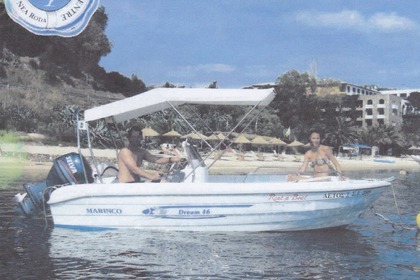
Marinco - Dream 46 | (2008)
Ab 120 € pro tag.

Clipper Boats - 42 | 3 Kabinen (2003)
Ab 271 € pro tag.

DUFOUR - Classic 45 | 4 Kabinen (2000)
Ab 343 € pro tag.

POSEIDON - 485 Open | (2017)
Ab 480 € pro tag.

Compass - 150 CC | (2018)
Ab 100 € pro tag.

Gib'sea - Gibert Marine - Gib'sea 444 | 4 Kabinen (1995)
Ab 500 € pro tag.

BENETEAU - OCEANIS 393 | 3 Kabinen (2002)
Ab 265 € pro tag.

Nireus - 490 Comfort | (2020)

Bavaria - 46 Cruiser | 4 Kabinen (2007)
Ab 429 € pro tag.

Beneteau - Oceanis 41.1 | 4 Kabinen (2004)

Dufour - 38,5 | 3 Kabinen (2006)

Bavaria - 44 | 4 Kabinen (2003)

Van de Stadt - 40ft Clipper | 3 Kabinen (2000)
Ab 171 € pro tag.

Beneteau - Oceanis 473 | 4 Kabinen (2002)

Alfa - 51 | 5 Kabinen (2002)
Entdecken sie das segelrevier chalkidiki mit scansail.
Als renommiertes Unternehmen für Yachtcharter bietet Scansail eine Vielzahl von Optionen für alle, die ein unvergessliches Segelerlebnis in Chalkidiki suchen. Mit einer breiten Palette von Bootstypen, Skipper-Optionen und verschiedenen Extras können Sie Ihr Segelabenteuer individuell gestalten.
Wie teuer ist ein Yachtcharter in Chalkidiki?
Die Kosten für die Yachtcharter in Chalkidiki variieren je nach Saison, Dauer, Bootstyp, Hafen/Marina, ob Sie einen Skipper benötigen und zusätzlichen Extras wie Ausrüstung und Crew. Hier finden Sie die durchschnittlichen Startpreise für die unterschiedlichen Bootstypen:
- Segelboot: 1.200 € in der Nebensaison und 1.700 € in der Hochsaison
- Katamaran: 3.360 € in der Nebensaison und 7.200 € in der Hochsaison
- Yacht: 15.100 € in der Nebensaison und 39.000 € in der Hochsaison
Kosten mit Skipper
Die Kosten für Yachtcharter mit Skipper variieren je nach Saison, Bootstyp und Extras. Die Kosten für einen Skipper betragen durchschnittlich 200 € pro Tag. Ein Skipper an Bord eines Bootes bringt viele Vorteile mit sich. Zum einen hat er die Fähigkeit, das Boot sicher und effektiv zu navigieren. Er kann Karten lesen und versteht die Strömungen und Gezeiten. Zum anderen hat ein erfahrener Skipper viele Stunden auf dem Wasser verbracht und weiß, wie man mit verschiedenen Bedingungen umgeht. Er kann den Gästen an Bord helfen, eine angenehme und sichere Reise zu genießen. Mit seiner Führung kann er das Boot auf Kurs halten und Sie zu den schönsten Plätzen von Chalkidiki führen.
Wohin segeln in Chalkidiki mit Scansail
Chalkidiki bietet zahlreiche Möglichkeiten für eine Segelreise. Jeder Ort hat seine eigenen Highlights, darunter Strände, Inseln und Küstenregionen. Hier sind einige Orte, die Sie auf Ihrer Segelreise durch Chalkidiki besuchen können:
- Sithonia: Die Halbinsel Sithonia bietet kristallklares Wasser und atemberaubende Strände. Hier können Sie auch den Berg Athos, ein UNESCO-Weltkulturerbe, besuchen.
- Kassandra: Die Halbinsel Kassandra bietet eine Vielzahl von Stränden und Buchten, die ideal zum Schnorcheln und Tauchen sind.
- Ouranoupolis: Dieser Küstenort am Rande von Athos ist der perfekte Ort für einen Zwischenstopp auf Ihrer Segelreise durch Chalkidiki.
Welche Bootstypen eignen sich für Chalkidiki
Chalkidiki bietet viele Möglichkeiten zum Segeln und es gibt eine Vielzahl von Bootstypen, die sich für die Gewässer der Halbinsel eignen. Die Wahl des richtigen Bootstyps hängt von verschiedenen Faktoren ab, wie der Anzahl der Passagiere, der Erfahrung des Kapitäns und der gewünschten Route.
- Segelyachten sind eine beliebte Wahl für die Erkundung der Küste von Chalkidiki. Sie bieten Platz für größere Gruppen und sind ideal für längere Segelreisen. Eine Segelyacht ermöglicht es den Passagieren, das Meer zu genießen und sich zu entspannen, während sie die malerische Küste der Halbinsel entdecken.
- Katamarane sind auch eine gute Wahl für diejenigen, die mit einer größeren Gruppe oder mit der Familie segeln möchten. Sie bieten viel Platz und Komfort und sind aufgrund ihres flachen Rumpfes und ihrer Stabilität auch bei unruhigem Seegang sehr beliebt.
- Motorboote sind eine schnelle und bequeme Option für diejenigen, die schnell zwischen den verschiedenen Orten in Chalkidiki reisen möchten. Sie sind ideal für kürzere Touren oder für den Besuch der verschiedenen Strände und Buchten an der Küste.
Zusammenfassend gibt es viele verschiedene Bootstypen, die sich für das Segeln in Chalkidiki eignen. Die Wahl des richtigen Bootstyps hängt von den individuellen Bedürfnissen und Anforderungen ab, aber es gibt für jeden das richtige Boot.
Beste Saison für Yachtcharter in Chalkidiki mit Scansail
Die beste Saison für Yachtcharter in Chalkidiki ist von Mai bis Oktober. In dieser Zeit sind die Wassertemperaturen angenehm und die Winde sind konstant. Die Preise variieren je nach Saison, wobei die Hochsaison in den Monaten Juli und August liegt.
Gründe für ein Wochenende auf dem Wasser in Chalkidiki mit Scansail
Ein Wochenende auf dem Wasser in Chalkidiki ist die perfekte Möglichkeit, dem Alltag zu entfliehen und die Schönheit des Meeres zu genießen. Mit Scansail können Sie ein Wochenende auf einer gemieteten Yacht verbringen, um die erstaunliche Landschaft und die unberührte Natur zu erleben.
Was kann man in Chalkidiki unternehmen?
Chalkidiki ist ein beliebtes Reiseziel und bietet viele Aktivitäten für Besucher jeden Alters. Egal, ob man alleine, als Paar oder mit der Familie reist, es gibt viele Dinge, die man unternehmen kann.
Eine der bekanntesten Aktivitäten in Chalkidiki ist das Entspannen an den malerischen Stränden der Halbinsel. Es gibt viele Strände, an denen man sonnenbaden, schwimmen und schnorcheln kann. Zu den beliebtesten Stränden gehören Sani, Kallithea und Possidi.
Wer gerne wandert, sollte einen Ausflug in den Berg Athos machen, der sich auf der östlichen Seite von Chalkidiki befindet. Es gibt viele Wanderwege, die durch Wälder, Olivenhaine und bergige Landschaften führen. Der Berg Athos ist auch bekannt für seine historischen Klöster, die man besichtigen kann.
Ein weiteres Highlight von Chalkidiki sind die kulinarischen Köstlichkeiten, die man in den vielen Restaurants und Tavernen der Halbinsel genießen kann. Die lokale Küche ist bekannt für ihre frischen Meeresfrüchte, aber es gibt auch viele Fleisch- und Gemüsegerichte, die man probieren sollte.
Für Familien mit Kindern gibt es viele Möglichkeiten, sich zu amüsieren, wie z.B. Wasserparks, Vergnügungsparks und Tierparks. Der Waterland Wasserpark in Thessaloniki und der Magic Park Vergnügungspark in Kassandra sind besonders beliebt.
In Chalkidiki gibt es auch viele historische Stätten und Sehenswürdigkeiten, die man besichtigen kann. Dazu gehören das antike Olynth, die byzantinische Festung in Ouranoupolis und der Petralona Höhlenkomplex.
Zusammenfassend bietet Chalkidiki eine Vielzahl von Aktivitäten für jeden Geschmack und jede Interessengruppe. Ob man die Natur genießen, die lokale Küche probieren oder historische Stätten besichtigen möchte, es gibt immer etwas zu tun.
Anreise nach Chalkidiki: Verschiedene Optionen für eine unvergessliche Reise
Die Halbinsel in Nordgriechenland kann auf verschiedene Arten erreicht werden.
- Mit dem Flugzeug: Der nächstgelegene Flughafen ist der Flughafen Thessaloniki (SKG), der von vielen europäischen Städten aus angeflogen wird. Von dort aus kann man entweder ein Auto mieten oder den Bus nehmen, um nach Chalkidiki zu gelangen.
- Mit dem Auto: Chalkidiki ist über eine gut ausgebaute Autobahn mit Thessaloniki verbunden, so dass man mit dem Auto anreisen kann. Die Fahrzeit von Thessaloniki nach Chalkidiki beträgt etwa eine Stunde.
- Mit dem Bus: Es gibt regelmäßige Busverbindungen von Thessaloniki nach Chalkidiki. Die meisten Busse fahren von der zentralen Busstation in Thessaloniki ab und halten in verschiedenen Orten entlang der Küste von Chalkidiki.
- Mit dem Taxi: Es ist auch möglich, ein Taxi von Thessaloniki nach Chalkidiki zu nehmen. Dies kann jedoch teurer sein als die anderen Optionen.
Zusammenfassend gibt es verschiedene Möglichkeiten, um nach Chalkidiki zu gelangen, je nachdem, welche Option für Sie am besten geeignet ist. Ob Sie mit dem Flugzeug, dem Auto, dem Bus oder dem Taxi anreisen, Sie werden sicherlich eine angenehme und unvergessliche Reise nach Chalkidiki haben.
boot in der Nähe von Chalkidiki chartern
Entdecken Sie weitere Charterboote in Chalkidiki und Umgebung.
- Empfohlene Boote zuerst
- Preis - Preis aufsteigend
- Bewertungen - Beste Bewertungen zuerst
Brauchen Sie Hilfe?
Ein SamBoat-Experte findet für Sie die besten Angebote.
Ein Experte findet die besten Angebote für Sie!
Perfekter Service, fairer Preis und sehr nette Leute! Wir hatten einen sehr schönen Tag und können Barracuda Boats nur weiterempfehlen! Danke, Vagelis!
Der Service ,die Bitte sind wirklich super, auch die eigene Naviapp um die Buchten zu finden ist Klasse, Preis-Leistung top!!
Segeln nach Chalkidiki (Regionalbezirk), welches Boot wählen?
Wenn Sie nach den passendsten Booten suchen, sind die Motorboote eine gute Wahl. Anzahl der verfügbaren Boote :
- 19 Segelboote
- 74 Motorboote
- 4 Katamarane
Segeln ohne Bootsführerschein ist machbar.
Bootsvermietung in chalkidiki (regionalbezirk): wie funktioniert das, wie viel kostet es ein boot in chalkidiki (regionalbezirk) zu mieten, wie viele personen können an bord eines bootes gehen, verfügbare häfen von chalkidiki (regionalbezirk).
- Neos Marmaras Port
- Porto Carras
- Marina Lagonisi
Informationen zur Bootsvermietung in Chalkidiki (Regionalbezirk)
Unsere anderen ziele, bestpreise garantiert.
Eine große Auswahl an Booten zum Mieten, bis zu 40% günstiger!
Versicherungen
Bootsanzeigen werden regelmäßig geprüft, um eine höchstmögliche Qualität zu gewährleisten.
Sichere Bezahlung, sichere Verwaltung der Kaution und Charter Kundenschutz durch Insolvenzabsicherung.
Bester Kundenservice
Ein Expertenteam, das Ihnen bei Fragen jederzeit zur Verfügung steht.
Motorboot mieten in Chalkidiki
- Boot mieten
- Schönste Orte um ein Motorboot zu mieten

Beneteau - Antares 980 | 8 Personen (2008)
Ab 1.250 € pro tag.

BERTRAM - 46.6 flybridge | 12 Personen (2006)
Ab 1.990 € pro tag.

PRINCESS - 55 | 10 Personen (1998)
Ab 1.800 € pro tag.

mercan stark 45 ft 2024 - stark 45 | 25 Personen (2024)
Ab 1.590 € pro tag.

Fairline - targa | 10 Personen (2010)
Ab 1.100 € pro tag.
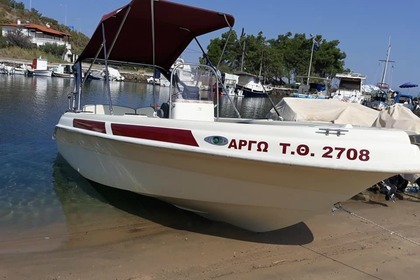
Karel - 500 | 5 Personen (2012)
Ab 250 € pro tag.


Cranchi - Zaffiro 34 | 10 Personen (2007)
Ab 450 € pro tag.

Karel - 530 | 6 Personen (2018)
Ab 300 € pro tag.

Exantas Marine - Omega 33 | 12 Personen (2014)
Ab 1.300 € pro tag.

Traditional - Wooden Motorsailer | 13 Personen (1984)
Ab 800 € pro tag.

Ierissos shipping - Custom made | 35 Personen (1993)
Ab 640 € pro tag.

BENETEAU - Antares 12 | 10 Personen (2010)
Ab 1.500 € pro tag.
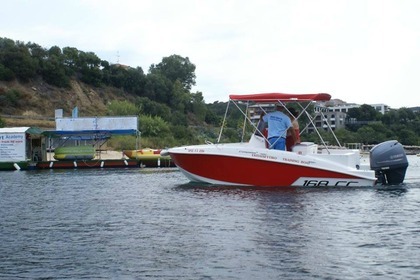
Compass - 168 CC | 7 Personen (2017)

CORRECT CRAFT - Ski Nautique 196 | 6 Personen (2006)

Wellcraft - Marine | 8 Personen (2008)
Ab 490 € pro tag.

Azimut - 43 | 12 Personen (2009)
Ab 1.700 € pro tag.

BAYLINER - Capri 1750 | 4 Personen (2000)
Ab 620 € pro tag.

BAYLINER - 185 BR | 5 Personen (2004)
Ab 720 € pro tag, motorboot mieten auf chalkidiki - nordgriechenland erleben.
Chalkidiki, auch als Halkidiki bekannt, ist eine malerische Halbinsel in Nordgriechenland und ein beliebtes Reiseziel für Wassersportbegeisterte und Naturliebhaber. Die Region ist besonders bekannt für ihre kristallklaren Gewässer, wunderschönen Strände und zahlreichen versteckten Buchten. Chalkidiki ist in drei kleinere Halbinseln unterteilt: Kassandra, Sithonia und Athos.
Das Mieten eines Motorboots ist eine hervorragende Möglichkeit, die versteckten Schönheiten der Halbinsel zu erkunden. Es ermöglicht Ihnen, abgelegene Buchten und Strände zu entdecken, die sonst schwer zugänglich sind.
Die besten Strände auf Chalkidiki mit dem Motorboot erkunden
Chalkidiki ist berühmt für seine goldenen Sandstrände und kristallklaren Gewässer. Ein Motorboot ermöglicht es Ihnen, einige der besten und oft abgelegenen Strände der Region zu entdecken. Hier sind einige der besten Strände, die Sie mit einem Motorboot in Chalkidiki erkunden sollten:
- Kavourotrypes (Sithonia): Oft als "Mini-Maldiven von Chalkidiki" bezeichnet, besteht dieser Ort aus einer Reihe kleiner Buchten mit feinem weißen Sand und türkisfarbenem Wasser. Er ist ideal zum Schwimmen und Sonnenbaden in einer nahezu unberührten Umgebung.
- Karydi Beach (Vourvourou, Sithonia): Dieser Strand ist berühmt für sein flaches, klares Wasser und seine weißen Sandbänke. Er ist perfekt zum Schwimmen und Schnorcheln.
- Alykes Beach (Kassandra) : Ein weitläufiger Strand mit goldenem Sand und einem wunderschönen Blick auf das Meer. Die Bucht bietet auch Schutz vor Winden und ist daher ideal für Bootsfahrer.
- Ammouliani Insel: Zwischen Sithonia und Athos gelegen, bietet diese Insel mehrere atemberaubende Strände wie Alikes und Megali Ammos. Sie können Ihr Boot ankern und diese paradiesischen Strände genießen.
- Akti Oneirou (Sithonia) : Ein wunderschöner und eher abgelegener Strand mit klarem Wasser und einer entspannten Atmosphäre. Hier können Sie vor Anker gehen und die Ruhe abseits der Massen genießen.
- Trani Ammouda (Ormos Panagias, Sithonia): Ein langer Sandstrand mit kristallklarem Wasser, ideal zum Schwimmen und Entspannen.
- Kalogria Beach (Kassandra) : Bekannt für sein tiefblaues Wasser und seinen feinen Sand. Es gibt auch eine beeindruckende Unterwasserhöhle, die Taucher und Schnorchler erkunden können.
Wenn Sie mit einem Motorboot die Strände von Chalkidiki erkunden, haben Sie nicht nur den Vorteil, schwer zugängliche Buchten zu erreichen, sondern Sie können auch Ihre eigene private Ecke im Paradies finden, weit weg von den Menschenmassen. Egal, ob Sie sonnenbaden, schwimmen oder einfach nur die natürliche Schönheit der Region genießen möchten, Chalkidiki bietet zahlreiche Optionen.
Was sind die Kosten für das Motorboot chartern auf Chalkidiki?
Die Kosten für das Mieten eines Motorboots in Chalkidiki variieren je nach verschiedenen Faktoren wie Bootstyp, Mietdauer, Saison und Anbieter. Ein kleines Boot für kurze Ausflüge in Küstennähe, das Platz für 4 bis 6 Personen bietet, könnte beispielsweise zwischen 200 und 500 Euro pro Tag kosten. Wenn Sie ein mittelgroßes Boot mit mehr Annehmlichkeiten und Platz für bis zu 10 Personen bevorzugen, sollten Sie mit Preisen zwischen 400 und 800 Euro pro Tag rechnen.
Für Luxusyachten und größere Boote , die oft mit zusätzlichen Dienstleistungen wie einem Skipper oder Catering kommen, können die Kosten deutlich höher sein und über 1.000 Euro pro Tag liegen. Wenn Sie einen Skipper hinzufügen möchten, fallen normalerweise zusätzliche Kosten zwischen 150 und 200 Euro pro Tag an.
Es ist auch wichtig zu beachten, dass die Treibstoffkosten oft nicht im Mietpreis enthalten sind und nach Verbrauch berechnet werden. Zudem ist meistens eine Kaution erforderlich, und eine zusätzliche Versicherung kann ebenfalls kostenpflichtig sein.
Preisschwankungen je nach Saison sind ebenfalls üblich. In der Hochsaison, die in der Regel von Juni bis September geht, können die Preise deutlich steigen. Einige Anbieter bieten auch Halbtages- oder Stundentarife an, was eine kostengünstigere Option für kürzere Ausflüge sein könnte.
Welche Destinationen, kann man auf Chalkidiki mit dem Boot besuchen?
Die Halbinsel Chalkidiki bietet eine Fülle von Destinationen, die sich hervorragend für Bootstouren eignen. Von abgelegenen Buchten bis hin zu belebten Touristenorten, hier sind einige der sehenswertesten Ziele, die Sie mit einem Motorboot auf Chalkidiki besuchen können:
- Vourvourou und Diaporos Insel: Vourvourou ist bekannt für seine atemberaubende Landschaft und ruhige Gewässer. Ganz in der Nähe liegt die Insel Diaporos, die für ihre natürliche Schönheit und kristallklaren Buchten bekannt ist.
- Sani Marina (Kassandra): Eine der luxuriösesten Marinas in der Region, ideal für einen Halt, um erstklassige Einrichtungen und Restaurants zu genießen.
- Ammouliani Insel : Diese kleine Insel bietet traumhafte Strände und ist ein beliebtes Ziel für Tagesausflüge. Sie ist zwischen den Halbinseln Sithonia und Athos gelegen.
- Porto Koufo (Sithonia) : Dieser natürliche Hafen ist einer der sichersten und tiefsten in Griechenland. Es ist ein ruhiger Ort, ideal zum Ankern und Genießen der natürlichen Umgebung.
- Nea Potidea (Kassandra) : Dieser Kanal verbindet den Thermaischen Golf mit dem Toroneos Golf und bietet eine schöne Kulisse für Bootsfahrer.
- Kallithea (Kassandra) : Bekannt für sein pulsierendes Nachtleben und seine wunderschönen Strände, ist Kallithea ein Muss für diejenigen, die das Beste aus ihrem Bootsausflug machen möchten.
- Nikiti (Sithonia) : Dieses charmante Fischerdorf hat sich zu einem beliebten Touristenziel entwickelt. Hier können Sie frischen Fisch und Meeresfrüchte genießen und die lokale Kultur erleben.
Was ist die beste Saison, um ein Motorboot auf Chalkidiki zu chartern?
Die beste Zeit für das Chartern eines Motorboots auf Chalkidiki fällt in der Regel in die Monate von spätem Frühling bis frühem Herbst. Ab Mai bis etwa Ende September sind die Wetterbedingungen ideal für Bootsfahrten und Wassersport. Während dieser Zeit sind die Tage sonnig, das Wasser ist warm, und die Winde sind in der Regel moderat, was das Navigieren einfacher macht.
Der Sommer, insbesondere Juli und August, ist die Hochsaison, in der die Strände und Buchten von Chalkidiki am belebtesten sind. Für diejenigen, die die Höhe des griechischen Sommers mit seiner lebhaften Atmosphäre erleben möchten, sind diese Monate perfekt. Wer es jedoch etwas ruhiger mag und die Möglichkeit haben möchte, abgelegenere Buchten und Strände zu erkunden, sollte die Monate Mai, Juni und September in Erwägung ziehen. In diesen Zeiträumen ist das Wetter immer noch hervorragend, aber es gibt weniger Touristen, und die Preise für Bootsmieten können etwas niedriger sein. Alles in allem bietet Chalkidiki von spätem Frühling bis frühem Herbst eine hervorragende Gelegenheit für unvergessliche Bootsausflüge.
motorboote in der Nähe von Chalkidiki mieten
In Chalkidiki stehen zahlreiche Boote zur Miete zu Verfügung. Sehen Sie weitere Boote in der Umgebung.
Mieten Sie einen anderen Bootstyp in Chalkidiki
Sie interessieren sich für ein motorboote in Chalkidiki? Sehen Sie sich weitere Boote an, die Sie auf unserer Webseite mieten können
Yachtcharter Firmen
Yachtcharter Chalkidiki - Boot mieten Chalkidiki
Instant sailing yacht suchmaschine.
erweiterte Suche
Folgen Sie uns auf…
Benötigen sie hilfe , leider sind zur gewünschten zeit keine boote verfügbar..
Suchvorschlag - bitte versuchen Sie, den Standort oder den Bootstypen zu ändern.
Nach oben scrollen
Arbeitszeit:
Montag - Freitag: 08:00-19:00 (CET)
Samstag: 08:00-16:00 (CET)

David Hadaller
- Geboren: 01.01.1999
- Lebt in: Zagreb, Croatia
- Sprachen: EN, DE, HR, ES
- Email: [email protected]
- Handy: +385 98 654 3217
- Beruf: Skipper, hostess
auf Englisch:
+44 203 807 3932
+1 866 889 6996
+385 91 5424 630
auf Deutsch:
Österreich:
+43 7209 02390
auf Italienisch:
+385 21 469 031
auf Französisch:
Auf tschechisch:, auf kroatisch:, auf russisch:, vielen dank für ihre buchung bei instant sailing, thank you for doing business with instant sailing.
Boot ohne Führerschein mieten Chalkidiki
- Boot mieten ohne Führerschein

Boot ohne Führerschein Compass 150 CC 30PS (2018)
Ab 95 € pro tag.

Boot ohne Führerschein Nireus 490 Optima 30PS (2021)
Ab 105 € pro tag.

Ab 100 € pro Tag

Boot ohne Führerschein Nireus 490 Comfort 30PS (2021)

Boot ohne Führerschein Marinco 170 cc 30PS (2020)

Boot ohne Führerschein Marinco 170cc 30PS (2020)

Boot ohne Führerschein Nireus 490 Comfort 30PS (2020)

Boot ohne Führerschein Wavemaster 450 30PS (2012)
Ab 90 € pro tag.

Boot ohne Führerschein Marinco 450 30PS (2009)
Ab 60 € pro tag.

Boot ohne Führerschein Fibrafort 487 30PS (2010)

Boot ohne Führerschein POSEIDON 499 30PS (2018)
Ab 150 € pro tag.

Boot ohne Führerschein Karel 460 30PS (2012)
Ab 180 € pro tag.

Boot ohne Führerschein Thomas Alexander 440 30PS (2013)

Boot ohne Führerschein Thomas Alexander 440 30PS (2008)

Boot ohne Führerschein Blu&Blu Gran Turismo 475 Special 30PS (2021)

Boot ohne Führerschein Marinco Dream 46 30PS (2008)

Boot ohne Führerschein POSEIDON 480 30PS (2017)

Boot ohne Führerschein POSEIDON 485 Open 30PS (2017)
Ab 480 € pro tag, without license in der nähe von chalkidiki chartern.
In Chalkidiki sind Charterboote verfügbar. Entdecken Sie weitere Boote in der Umgebung.
Mieten Sie eine andere Bootsart in Chalkidiki
Sind Sie auch an anderen Bootstypen als without license in Chalkidiki interessiert? Entdecken Sie weitere Boote auf unserer Webseite
Bootsvermietung und Yachtcharter in Halkidiki
77 Boote verfügbar

Katamaran Dufour 48 · 2023
Nea moudania port, nea moudania, griechenland.
- 14,7 m lang
- Skipper optional
- Durchgelattetes Großsegel

Katamaran Dufour 48 · 2021
- 14,63 m lang

Segelboot Hanse 342 · 2006
Marina nikiti, nikiti, griechenland.
- 10,35 m lang
Sie finden nicht, was Sie brauchen? Sprechen Sie noch heute mit unseren Urlaubsexperten.

Segelboot Dehler 42 · 2003
Porto carras marina (néos marmarás), sithonia, griechenland.
- 11,72 m lang

Katamaran Lagoon 420 · 2008
Paliouri, paliouri, griechenland.
- 12,62 m lang

Katamaran Lagoon 380 · 2003
- 11,55 m lang

Katamaran Lagoon 450 F · 2019
- 13,96 m lang

Segelboot Jeanneau 51 · 1991
Marina miraggio, paliouri, griechenland.
- 15,38 m lang
- Crew an Board
- Rollgroßsegel

Segelboot Dufour 45 Classic · 2009
Polychrono beach, polychrono, griechenland.
- 13,75 m lang
- Mit Skipper

Segelboot Bavaria Cruiser 40 · 2007
- 12,1 m lang
Unsere Partner
Hamburger Yacht Insurance Schomacker
European Insurance & Services
Pantaenius Yacht Insurance

Katamaran Lagoon 420 · 2009

Segelboot Jeanneau Sun Odyssey 490 · 2024
- 14,42 m lang

Katamaran Fountaine Pajot Lavezzi 40 · 2008
- 11,9 m lang

Segelboot Dufour 460 Grand Large · 2019
- 14,15 m lang

Katamaran Lagoon 400 S2 · 2015
- 11,97 m lang
Willkommen bei GetWet
Genießen sie einen unvergesslichen tag in vourvourou mit all seinen inseln und buchten, entdecken sie unsere boote.
Alle unsere Boote haben moderne Viertaktmotoren mit 25/30-175 Pferdestärke Motoren. Sie sind völlig ausgestattet und sie bieten Ihnen und Ihren Freudnen oder Ihrer Familie (bis 8 Personen) jeden Komfort an um einen schönen Tag am Meer und unter der Sonne zu genießen.

Compass 150cc

GS Nautica Open 470

GS Nautica Open 510

GS Nautica Open 630

Nautica BWA 23

Treffen Sie Chalkidiki
Das Paradies zog in Vourvourou um . Ein Ort von ausgezeichneter natürlicher Schönheit, kombiniert mit wunderschönen Sandstränden und viel Grün um sie herum.

Happy Captains

Eva Williams
“If I were asked to describe paradise like this would describe him . Get Wet thanks for the opportunity you gave me to discover the paradise named Vourvourou” “Εαν μου ζητούσαν να περιγράψω τον παράδεισο, κάπως έτσι θα τον περιέγραφα. Get Wet ευχαριστώ πολύ για τη δυνατότητα που μου έδωσες να τον ανακαλύψω”
Alexandros Metaxas
“I highly recommend Get Wet. The boat was clean and Vassilis instructions very helpful. We will definitely be back next summer”
“Προτείνω ανεπιφύλακτα τη Get Wet. Το σκάφος ηταν πεντακάθαρο και οι οδηγίες του Βασίλη πολύ χρήσιμες. Θα τα ξαναπούμε σίγουρα το επόμενο καλοκαίρι”
Olga Nikolova
“That is the first time we have rented a boat and it was amazing! Super easy! The staff was very nice and after a short instruction we were ready to go. We will definitely do it again!” “Ήταν η πρώτη φορά που νοικιάσαμε βάρκα και ήταν φανταστικά! Και πανεύκολα! Το προσωπικό ήταν πολύ εξυπηρετικό και μετά απο μια μικρή επίδειξη είμασταν έτοιμοι προς αναχώρηση! Θα το ξανακάνουμε σίγουρα!”
Let The Sea Set You Free
- Vourvourou intersection, Agios Nikolaos Halkidikis
- +30-6980-614-333
- Mon - Sun 09:00 - 18:00

Olympic 490 (30hp)
Open alexander 460 (30hp/bigfoot), tempest 450 (30hp), open alexander 440 (25hp).
- Photo Gallery
- Rent Terms & Conditions

Welcome to Bluewaterboats - Rent a Boat Vourvourou
Explore the crystal waters of Vourvourou and the surrounding islands and enjoy a unique vacation experience by boat. By renting a boat from bluewaterboats, you can explore for a full day the magnificent cluster of nine islands of Vourvourou, swim in isolated beaches that cannot be accessed by vehicle and discover your own private beach!
Rent a Boat – Vourvourou Halkidiki
Quicksilver activ 555 (115hp).
Persons : 6 Licence needed : YES

Persons : 5 Licence needed : NO
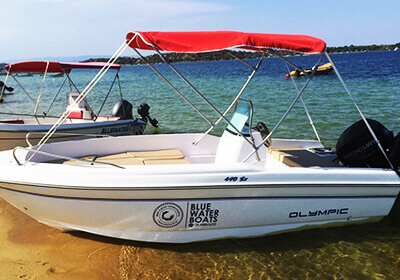
Persons : 6 Licence needed : NO

Dream 460 (30hp)

Persons : 4 Licence needed : NO
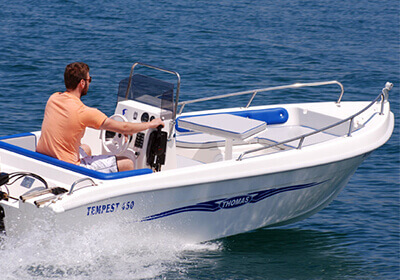
No Operating License Needed
For most of our boats (up to 30hp) no operating license is needed. If you want to experience the thrill of our speed boats, just let us know
Safety & Instructions
The boat will be ready for you from 09:00. Boat handling, safety and navigation instructions are provided and you are ready to go.
Fully Equipped
All our vessels have four-stroke engines and are fully equipped to provide you and your friends (up to 6 persons) the experience of a day full of sea, sun and relaxation.

Testimonials
We loved the experience, it is a great way to discover some of Sithonia’s greatest beaches and enjoy the sea. We totally recommend it! Dimitris and Kostas are very friendly and helpful!
Laura - From Rome, Italy
A BIG thank you to Blue water boats and its super friendly and helpful team!! We have spend a delightful day on one of their well equipped boats, discovering and exploring the islands and bay near Vourvourou. It was one of the highlights of our stay in Greece!! I can strongly recommend to do the
Cornelia Kretschmer - From France
Rented for 2 days with Kostas and had a fantastic time. The engines are all new and the boats are clean and modern. I was fortunate enough to be the first to rent his new Activ 550 with the bigger engine, very nice boat for doing longer trips. Thank you Kostas, you gave us the
Stephen - From Scotland
It was unforgetable experience! We enjoyed our little exploration trip so much. *** views and unbelievable crystal water. The guys were really friendly. I’m shure we’ll come back and do it again soon.
Valentin & Ines - From Bulgaria
It was really great joining this location by sea… Super experience… The guys are very friendly and helped a lot… We feeled save every time (it was our first trip with a boad + 30 PS) Would recommend this guys!!!!
Kerstin & Sebastian - from Germany
Request for rent - Check boat availability

You can always call us directly on +30-6980-614-333

Boot mieten Chalkidiki: Entspannung erleben Chalkidiki bietet zahlreiche Möglichkeiten, ein Boot zu mieten, um die beeindruckende Küstenlandschaft der griechischen Halbinsel zu erkunden. Von malerischen Orten wie Kassandra, Sithonia oder dem Athos aus können Sie entlang der kristallklaren Wasser segeln, versteckte Buchten entdecken oder zu ...
Blue secret is a well-established rent a boat company which commenced operations in 2012 in the small graphical village of Polychrono, Halkidiki. Beautiful Places The perfecture of Halkidiki, Northern Greece, is considered one of the most beautiful holiday destinations in Greece.
Im Allgemeinen hängen die Kosten für einen Katamaran, eine Yacht oder ein Motorboot in Chalkidiki vom Bootstyp, der Reiseroute, der Dauer Ihrer Yachtcharter und davon ab, ob Sie einen Kapitän an Bord haben müssen oder nicht. Ein Motorbootcharter kostet ab 60 € pro Tag. Ein Segelboot in Chalkidiki zu mieten kostet ab 190 € pro Tag.
Bootsvermietung Chalkidiki Mieten Sie schnell und günstig ein Motor- oder Segelboot mit Scansail. 100 % sicher, 100 % nutzerfreundlich. Chalkidiki Yachtcharter - Charterexperte seit 1983 - Scansail Entscheiden Sie sich für einen Chalkidiki Yachtcharter mit oder ohne Skipper.
Ein Motorboot mieten in Chalkidiki Click & Boat ist eine Plattform für Bootsvermietungen zwischen Privatpersonen. Hier können Sie zahlreiche Boote für einen Ausflug aufs Wasser finden.Motorboote, Segelyachten, Katamarane und Hausboote stehen in zahlreichen Ausführungen zur Verfügung.So finden Sie das passende Boot für einen Tag, ein Wochenende oder einen Urlaub auf dem Wasser.
Yachtcharter in vielen Revieren der Welt - Chalkidiki und viel mehr. Egal ob Segelboot, Motorboot oder Katamaran, bei Happycharter gibt es sicher das richtige Boot. ... Ihr Internet-Spezialist für Yacht-Charter und Bootsvermietung hat für jeden das richtige Charter-Boot oder Charter-Yacht! Boote zum Mieten in großer Auswahl. Bootsverleih ...
Entdecken Sie Nikiti — Chalkidiki Yachtcharter zu unschlagbaren Preisen! 17 privater Boot Mieten mit Skipper und Besatzung, ab $ 207 pro Tag.
Nr.1 Bootsvermietung in Chalkidiki (Regionalbezirk). Motor- oder Segelboot/Katamaran optional mit Skipper mieten. Sichere Zahlung Flexible Stornierung Bester Preis
Die Kosten für das Mieten eines Motorboots in Chalkidiki variieren je nach verschiedenen Faktoren wie Bootstyp, Mietdauer, Saison und Anbieter. Ein kleines Boot für kurze Ausflüge in Küstennähe, das Platz für 4 bis 6 Personen bietet, könnte beispielsweise zwischen 200 und 500 Euro pro Tag kosten. Wenn Sie ein mittelgroßes Boot mit mehr ...
Top Angebote für Boot mieten in Chalkidiki ⛵ Bestpreisgarantie Yacht mieten in Chalkidiki online Mit oder ohne Skipper ☎ +49 30 56796038
Wählen Sie zwischen Bareboat-Charter oder chartern Sie ein Boot mit Skipper und genießen Sie Griechenland . En De It 24/7 Kundendienst: +385 91 5424 630 | [email protected] Navigation ausblenden. ... Yachtcharter Chalkidiki - Boot mieten Chalkidiki. Instant Sailing Yacht Suchmaschine.
Einfache Buchung für Yachtcharter-Urlaub in Halkidiki. Sortieren Sie Boote nach Ihren Wünschen, sehen Sie sich zuverlässige Bewertungen an, sehen Sie sich echte Bootsfotos an, zahlen Sie sicher und … fertig!
from 303,792 ₽ /day. View yacht. 1. 2. ... 4. Showing 1-18 of 65. Halkidiki offers 65 yachts for rent · Rental prices start from 72 € per day.
Boot ohne Führerschein mieten Chalkidiki .Klicks und zu den besten Preisen. Entdecken Sie die größte Auswahl an Charterbooten Boot mieten Chalkidiki, Mieten Sie schnell und günstig ein Motor- oder Segelboot mit Click&Boat. 100 % Sicherheit, 100 % Kundenfreundlichkeit.
Top Angebote für Boot mieten in Halkidiki ⛵ Bestpreisgarantie Yacht mieten in Halkidiki online Mit oder ohne Skipper ☎ +49 30 56796038. LETZTE CHANCE - BLACK FRIDAY ANGEBOTE - SPAREN SIE BIS ZU 60%. Close. Wo soll es hingehen? Daten hinzufügen. Für Partner.
Mieten Sie ein Boot in Vourvourou, Chalkidiki, Griechenland. Moderne Boote, voll ausgestattet zu den besten Preisen! Keine Lizenz erforderlich!
Rent a Boat Vourvourou Sithonia Halkidiki. Explore the crystal waters of Vourvourou and the surrounding islands and enjoy a unique vacation. Vourvourou intersection, Agios Nikolaos Halkidikis +30-6980-614-333; Mon - Sun 09:00 - 18:00; Home; Boats. QuickSilver Activ 555 (115hp)
Mieten Sie ein Boot in Chalkidiki mit Tubber zum besten Preis Mit Versicherung Bester Preis 24/7 Expertenrat
Unsere beliebtesten Bootsfahrten in Chalkidiki. 1. Athos: Glasboden-Bootstour und Besuch der Insel Amouliani. Nimm teil an einer geführten Sightseeing-Kreuzfahrt um die Athos-Bucht in Chalkidiki, um den imposanten westlichen Teil des Heiligen Berges Athos in einem Glasbodenschiff zu besichtigen. Nachdem du 6 der 9 örtlichen Klöster ...
Walking tour around Moscow-City.Thanks for watching!MY GEAR THAT I USEMinimalist Handheld SetupiPhone 11 128GB https://amzn.to/3zfqbboMic for Street https://...
On 22 March 2024, a terrorist attack which was carried out by the Islamic State (IS) occurred at the Crocus City Hall music venue in Krasnogorsk, Moscow Oblast, Russia.. The attack began at around 20:00 MSK (), shortly before the Russian band Picnic was scheduled to play a sold-out show at the venue. Four gunmen carried out a mass shooting, as well as slashing attacks on the people gathered at ...
The Moscow International Business Center (MIBC), also known as Moscow-City, is a commercial development in Moscow, the capital of Russia.The project occupies an area of 60 hectares, and is located just east of the Third Ring Road at the western edge of the Presnensky District in the Central Administrative Okrug.Construction of the MIBC takes place on the Presnenskaya Embankment of the Moskva ...
🎧 Wear headphones for the best experience.For watching on a big screen 4K.In this video, we will take a walk among the skyscrapers of the Moscow City Intern...
- schnellboot

MEMBER LOGIN

DONATE TO SUPPORT NOMADIC PUPILS
3.1 Before you start writing the exam
As you enter the examination hall and find your seat take a good look at your surroundings. See where the clock is and check that the time it is showing corresponds to the time on your watch. There is nothing worse than being told that the exam finishes at 12.30 and then being told to stop writing at what you think is 12.25 simply because your watch is 5 minutes behind the exam hall clock.
If at any stage in the exam there is a problem with your seating position then tell an invigilator who will do all that is possible to help. For instance the sun may be in your eyes or you are unable to see the clock in which case you will probably be re-seated somewhere else. If your desk wobbles then use some paper to stabilise it. Whatever happens make sure that you are completely happy with where you are sitting. After all if something is irritating you now then it will be irritating you even more in an hours time when you are trying to concentrate and you will be distracted from the task in hand.
The minute you feel yourself starting to get nervous or panicky start taking deep breaths and stop thinking about the exam until you’ve calmed down again.
If you are feeling unwell, even if it’s just a cold, then tell an invigilator before the exam starts. It can’t do any harm and they might make an allowance for it if you don’t do as well as you are expected to do.
Check that you have been given the correct exam paper and read the instructions carefully. Make sure you understand how many questions you are expected to answer and, if the paper is split into sections, how many questions from each section you should attempt. Also make sure that you know how much time you have for the exam. Many people get so used to doing past papers that they invariably assume that they know exactly what they have to do and don’t bother reading the instructions. Just be aware that the format of the exam may well have changed so read the instructions carefully. If there is anything you are unsure of either before the exam starts or during it then ask an invigilator to explain.
On the front of the paper you will be told how many questions there are. Check that there really are that many questions. This not only confirms that your paper has been printed correctly but also makes you aware of questions which you may well have missed, for instance on the back page where many people forget to look.
As soon as you are allowed to, start jotting down all the things from your revision that you think you might forget, for example anything you learnt in the last few minutes before you entered the exam. Sometimes you might be allowed to write from the time you sit down but often you will have to wait until you are told you can start writing. Don’t write unless you are sure you are allowed to. Ask if you are unsure.
- Check your watch shows the same time as the clock
- If you are unhappy with your seating get it changed
- If you feel nervous breathe deeply
- If you feel unwell tell an invigilator
- Check that you have the correct paper
- Make sure you understand the instructions
- Check there are the correct number of questions
3.2 HOW TO PICK YOUR QUESTIONS
When you are allowed to start take a few deep breaths and then briefly read through all the questions just to overcome your initial anxieties. Hopefully having seen the questions you will heave a sigh of relief. If not then take some more deep breaths and relax – you’ve done the work and you’ll be OK.
Go back and read through the questions again, more carefully this time. Every time you read a question it will begin to make more sense and your confidence will grow. This time mark all the questions that you feel able to attempt. Don’t worry if you pick too many or too few. Just mark the questions you feel you could do if you had to.
From the questions you have marked as possibles pick what looks like the easiest and attempt it first. When you’ve completed this question go back and briefly read through all the remaining questions again. Pick the easiest again and answer it. Continue this process until you’ve completed the required number of questions. The continual reading of all the questions in between answering them allows your subconscious to mull things over in preparation for the questions to come while you get on with writing your answer. By answering your best question first you will be boosting your confidence.
Don’t worry if all the questions seem impossible. It is more likely that you are just nervous rather than unable to do them. Your mind has just gone blank for a few minutes. Think of something else – a friend, a joke, or anything unrelated to the exam. Take your mind elsewhere for a few minutes. Now take a few deep breaths and go back to reading the questions. You should find that you are now calmer and more relaxed. Continue reading through the questions. The more you read them the more familiar they will become and the more relaxed you will become. You will soon find yourself in a position where you are able to attempt a question. (Remember seeing an ugly person for the first time and thinking to yourself, “wow! They’re ugly”! However the second and third times you see them whilst you still think of them as ugly it doesn’t hit you so hard because you’re getting used to the sight of them. It’s the same with exam questions – even the really ugly ones don’t look so bad after a while!).
Use a ruler to measure how long each question is and, if you can, attempt the longest questions. This may sound strange but the reasoning is as follows.
The longer a question takes to ask the more information it is giving you and providing you know the information required then the easier it is to answer. Very long questions are virtually telling you want they want in the answer.
For example consider two similar biology questions. The first asks you to describe how reproduction takes place in plants. The second lists some of the reproductive organs and asks you to describe what function each one plays in reproduction. Obviously the second question takes longer to ask.
It is fairly easy to see that the first question is fairly open-ended and is only giving you a vague idea of what is required in the answer. On the other hand the second question is telling you exactly what to write – it wants a description of each part and details of its reproductive role. Providing you know the function of each part you stand a much better chance of gaining full marks on this question than on the first in the time available. In the first question there are so many points that they could be looking for that it would need quite a lengthy answer to guarantee full marks. So the general rule is that the longer a question takes to ask, the more it is telling you about what is required in the answer and therefore the easier it should be to write a good answer.
A question commonly asked by students is should an extra question be attempted if time is available. The answer is – “well, maybe”. When you’ve completed the required number of questions the first thing you should do is go back and check them all thoroughly. If you have a lot of time available for checking then make use of it. It’s surprising how of ten you can spot a horrendous mistake in something you’ve already checked and thought to be a perfect answer.
If you’ve been back over your answers and checked and checked them and you are sure that they’re as good as you’re going to get them and you still have time on your hands then by all means attempt an extra question.
Make it known to the examiner that this question is an extra one by writing ‘extra question’ at the top and handing it in at the back of all your other answers. You will not pick up extra marks for doing an extra question. However if you’ve made a real mess of one of your other answers and you’ve scored better on the extra question then they will probably take the highest score if they’re feeling kind. And that is basically the only advantage of answering an extra question – it’s a safety net. Unless you’ve got loads of time on your hands I would suggest that time spent checking your answers would be far more profitable. Even after hours of checking you will still spot mistakes.
- Read through paper and mark possible questions
- Answer your best question first
- An impossible exam paper will begin to look easier as you become more familiar with it
- The longer the question, the easier the answer
- Spend time checking rather than answering an extra question
3.3 HOW TO PACE YOURSELF
Work out how much time you have available for each question allowing time for checking your answers at the end. Never allow more time for questions that look as though they might take longer. The questions are written such that a person who is capable of answering them has a sufficient amount of time in which to do so. If you run out of time on a question don’t over-run unless you are within a few minutes of finishing. Leave it and return to it later if you have time.
Be aware of the number of marks awarded for each section of the question and have a rough idea of how they will be awarded. Don’t spend hours writing an answer to a question that only carries a couple of marks. Ask yourself what the examiner is looking for and answer accordingly.
If you find that you’ve completely run out of time on a question then make a list of the points you were going to make and move on to the next question. This makes sure that you don’t lose marks for not raising the points although you might lose some for lack of style. The fact that you’ve run out of time probably means that you weren’t answering the question concisely and your time would therefore be better spent on another question. Cut your losses and try and do better on the next question.
Keep an eye on the time as you write and be aware of the rate at which you should be picking up marks. For example, in an exam which lasts 120 minutes and has a total of 100 marks available you should be aware that you have to try and score a mark at a rate of almost one a minute allowing time for checking at the end. Every time you make what you believe to be a good point think to yourself – “that’s another mark”. This should help you to keep your score rate up.
Attempt what you believe to be the easiest question first followed by the next easiest, then the next and so on. If a question is easy then you should be able to answer it both well and quickly. This should give you time in hand later on to tackle the harder questions.
If you get stuck or bogged down at any stage and it looks as if the problem might take a while to sort out then leave the problem to your subconscious to sort out while you go and attempt another question. You can return to the ‘sticking point’ later if you have time. It is amazing how a fresh look at a question after your mind has had a while to think things over can suddenly make the solution seem obvious.
It is easier to score a mark at the start of a question than at the end. At the start you are fresh and will tend to be making your points thick and fast. Towards the end you will be looking for ways of winding up and completing your answer having already made most of your points. If you are having trouble composing a nice ending then just quickly finish it off and go on to another question where your time will be better spent. If you have time you can always return later and make a better finish.
Make sure that you always have the paper you require. If you are running low then put up your hand and ask for more before you run out so that you can continue writing while you wait. A pause in the middle of answering a question while you await the arrival of more paper will disturb your flow and your train of thought as well as your concentration.
Never waffle. Linking phrases are OK but always stick to the facts. Examiners are very good at spotting waffle and they also get very bored with it. Since you won’t get marks for waffle don’t waste valuable time writing it!
- Work out the time available for each question
- Allow time for checking at the end
- Be aware of how the marks will be awarded
- Attempt the easiest question first
- If you get stuck try another question and return later
- Be aware of how often you should be scoring a mark – If you run out of time then list the points you were going to make
- Marks are easier to gain at the start of questions than at the end
- Don’t waffle
3.4 SECRETS OF ESSAY QUESTIONS
When attempting an essay question the first thing you should do is read through the question carefully a number of times and underline the key words such as summarise, compare and contrast, discuss etc. etc. You would be amazed at how many people spend the whole of a ‘compare and contrast’ essay just comparing and consequently throw away half the possible marks by simply not doing what they were asked to do.
Having spent a few moments thinking about what the question is asking start noting down everything that comes into your head on the subject no matter how irrelevant it may seem. Try and keep your notes brief, to the point and as neat as possible. You should spend anything up to a quarter of the time available to you for the question (and maybe even longer), for the writing of these notes as they are the foundations for your essay. A house without foundations will fall down!
Once your rough notes are written you can start deciding which bits you do and don’t want to include in your answer. Go through your notes and number the parts you want to use in the order in which you want to use them. You are now formulating the structure of your essay. Don’t cross out unwanted notes because they may still be of use later on.
Now you are in a position to start writing your essay bringing up the points you made in your notes and putting them together in a smooth, flowing style.
This method of essay writing helps you to come up with a well structured and well thought out answer. Simply launching into writing an essay without any thought means that you could well get halfway through and suddenly think of other points which should have been raised earlier on, or a different angle from which to tackle the subject. By using notes you are able to empty your mind of the subject and then try and put your thoughts into some sort of logical order that hopefully makes sense.
Never forget one of the earliest rules you were taught regarding essay and story writing – beginning, middle and end. Start an essay by saying what you intend to do, then do it, then reach your conclusions and perhaps summarise what you have said.
Never be radical in your answers. Despite what you may think even at degree level free thought appears to be fairly limited.
Write what the examiner wants to hear and you will do well. Be radical in your answer and unless your argument is that of a genius then you risk losing more than you stand to gain. The rule in all exams is to play it safe, no matter what you really think.
Use examples and quotations as often as possible. Use of an example to back up your argument is a good essay technique and can only gain you marks. Don’t worry if the example or quotation is not quite 100% accurate – providing it’s close no one should mind too much.
Don’t be fooled into thinking that the more you write, the more marks you will get. Waffle will gain you no marks and will bore the examiner maybe even to such an extent that he misses a good point when you make one simply because it’s surrounded in waffle.
As you write your essay you should be consciously thinking to yourself as you go along “1 mark” for every good point you think you make. This is the way the examiner will probably be thinking when it is marked so if you can think in the same way it will probably help you to write quite a good essay.
If you find yourself running out of time then make a neat list of the points that you were going to raise at the end of your uncompleted essay. Write a note to the examiner in the margin such as “sorry, ran out of time”. Also, always hand in your rough notes. You may well pick up marks f or the points you were going to raise even though you didn’t have time to incorporate then into your essay.
If you know the person who is marking the exam, (i.e. it is an internal exam), then you are in an even better position to do well. Write what you think the marker will be looking for and if they taught you the subject then think back to the lectures and discussions you had with them. Write what they think and you can’t go far wrong!
Always hand in your rough notes with your essay. Write at the top of them – “Essay Plan”. This shows the examiner that you thought through what you were going to write and that you. Carefully planned your essay. You may well pick up a couple of extra marks for this. Handing in your rough notes also has the advantage that if you run out of time whilst writing the essay the examiner can still see what points you were going to make and also the way in which they would have fitted into the essay. Once again this could well pick you up marks which you wouldn’t have got if you had just stopped writing and handed in an unfinished essay.
If you make what you consider to be a good point near the beginning of your essay then try making the same point again later on. Use different wording and bring it up in a different way and you may just fool a weary examiner into giving you marks for it again! After all he’s probably seen hundreds of answers to this question so was it you who made the point or was it someone else? You can gain the odd free mark like this but don’t go overboard and use this trick more than a couple of times or your ploy will be spotted!
- Read the question carefully and note key words
- Make rough notes
- Put rough notes into order and compose essay
- A good essay has a beginning, a middle and an end
- Never be radical in your answers
- Use examples and quotations
- If you run out of time then list the points you were going to make
- Hand in your essay plan.
3.5 SECRETS OF MULTIPLE CHOICE QUESTIONS (KCPE)
Many people assume that multiple choice exams are easy. After all the answers are given to you so all you have to do is to choose the right one. It is strange therefore that many people don’t do particularly well in multiple choice exams. Multiple choice is easy providing you go about it in the correct way. There is a right method and a wrong method for attempting these types of exams and most people use the wrong method.
The wrong way of answering multiple choice exams is to read the question, look at the answers and choose the one that looks to be correct. The reason for this is that whilst there is only one correct answer there are other answers which are very plausible and are put there simply to mislead you. It is amazing how good we are at looking at an incorrect answer long enough to convince ourselves that it is correct!
The correct way to choose your answer is as follows. Use a blank piece of paper to cover up the questions and gradually pull it down to reveal the question but not the answers. Read the question carefully and work out the answer without looking at the answers you are given, (i.e. work it out just as if it were an ordinary exam question). Then reveal the answers and choose the one that matches yours.
If none of the answers matches then make a note of the question number and return to it later when a fresh approach may help you to come up with the right answer.
Don’t dwell on a question for too long. Time is limited and you could be picking up marks elsewhere rather than wasting time on a question that you can’t do.
Having completed the paper, hopefully with time to spare, go back and attempt the questions that you had trouble with. Your subconscious mind has had time to work on the problems and you may also find that other questions that you have done may have triggered your memory. Once again be careful not to get bogged down on a particular question. If you still have trouble then once again you should note down the question number.
Finally you will be left with a list of the questions which you really can’t do so the time has come to start guessing. Be careful, marks are sometimes deducted for wrong answers so make sure you are aware of whether this is the case in your exam.
Obviously there is no easy way to correctly guess an answer if you don’t know what it is in the first place! The best method is to divide the answers into ‘possibles’ and ‘impossibles’ thus narrowing down your choice. With the answers now visible you may be able to see where you went wrong in your initial workings out. At the end of the day though, if you really can’t work out the correct answer the only solution is to pick one of the ‘possibles’ at random and hope for the best. If marks are to be deducted for wrong answers then it is better not to guess but to leave the answer blank. You will then score nothing as opposed to losing a mark. In fact the whole point of marking multiple choice exams in this way is to discourage people from guessing. Looks like it works! Obviously if marks are not deducted for wrong answers then you have absolutely nothing to lose by guessing so pick the most likely of the ‘possibles’.
Most multiple choice exams consist of a question paper together with an answer sheet. They are often marked by computer and you indicate your answer by marking the appropriate box on the answer sheet. Make sure you are equipped with a soft pencil and a good rubber. Don’t use ink because you won’t be able to correct your mistakes.
Make sure that you know how many questions there are and how long you have to answer them. Always allow 10 to 15 minutes at the end for checking and completing unfinished questions. Rather than divide your time up on a per question basis, (i.e. 60 questions in 60 minutes is 1 question per minute), you should group the questions into blocks of, say 10, and allocate your time accordingly, i.e. 10 questions in 10 minutes. This is because some questions will be very quick and easy to answer while others will take longer. Grouping the questions in this way will even out the peaks and troughs in the timing.
Make sure that your mark on the answer paper corresponds to the correct question number. If you have left a question to go back to later it can be very easy to continue marking the answer sheet and forget to leave a space for the missing answer. If you do find that your answers have got out of step then tell an invigilator. You may be allowed some extra time to sort the mess out.
This problem can be avoided if you always crosscheck the question number with the answer number as you write the answer. Say to yourself, “question 7, answer 7” as you mark the answer sheet.
It is even more important than usual to read the instructions carefully in a multiple-choice exam. Make sure that you understand exactly how to indicate your answers on the answer sheet.
Sometimes marks will be subtracted for an incorrect answer, (e.g. 1 mark for a correct answer, no marks for no answer but 1 mark deducted for an incorrect answer). Make sure that you understand the marking procedure in your exam as it will affect the way you answer questions you are less sure about.
If there is anything that you don’t understand then ask an invigilator immediately.
Make sure that you understand the different styles of question throughout the exam paper. Some may give 5 different answers and ask which one is correct. Some will give 5 statements and ask which combinations are correct. Each time the style of question changes make sure that you understand how to answer it. Once again if you have any problems understanding what you have to do then ask an invigilator.
Do all your rough working on a piece of scrap paper but lay it out as if it were to be handed in, (i.e. don’t scribble and jot all over the place). This makes it easier to go back to a question and check your working if you need to. Clear notes will also make it easier to work out answers on problem questions when you return to them since your earlier mistake may be obvious. Untidy notes won’t help at all.
If you think you have worked out the answer to a particular question but you are not 100% sure about it then make a note of the question number and return to it later. When you return to the question work out the answer again. If it is the same as you got last time then you can be reasonably sure that you have got it right.
If you find yourself becoming stuck on a particular question then make a note of the question number and go back to it later. If you find a question easy then you are more likely to get it right so it makes sense to go through the paper and answer all the easy questions first. Once you’ve scored all the easy marks you can return to the more difficult questions.
Always get to the end of the paper. Very often there will be 10 easy questions at the end. If you get bogged down in the middle and don’t have time to finish then you have thrown away easy marks. These easy questions are often put at the end of a multiple choice paper to test your exam technique. People with poor technique may not get this far and will throw away some easy marks. People with good technique work through all the easy questions first and then return to the more difficult questions.
Don’t be fooled into thinking that just because you’ve got a lot of answers the same, (e.g. a lot of questions have the answer ‘C’), that you’ve got some of them wrong. Never let your choice for a particular answer be influenced by your other answers. Anyone who thinks that an answer to a question can’t be ‘C’ simply because the previous four questions have had the answer ‘C’ is only fooling themselves and will lose valuable marks.
In mathematical and scientific multiple choice exams watch out for the units. Very often you will find that you’ve got an answer in metres and the answer is given in centimetres. (e.g. You’ve worked out an answer to be 1m and the answers given include 1cm and 100cm. Obviously 100cm matches your answer but you would be amazed at the number of people who answer 1cm simply because they fail to look at the units). Remember, the answers are designed to mislead you so watch out for the examiners little tricks.
- Understand the instructions
- Understand the different question styles
- Understand the marking procedure
- Use a soft pencil on the answer sheet
- Make sure question and answer numbers correspond to each other
- Cover the answers up until you have worked out your answer
- Do the easy questions first
- If you get stuck, return to the question later
- Do your rough working neatly on scrap paper
- Divide questions into ‘blocks’ and allocate time per block
- Divide answers into ‘possibles’ and ‘impossibles’ for guessing
- Watch out for trick answers
3.6 SECRETS OF SHORT ANSWER QUESTIONS
Treat short answer questions in the same way as you would treat an essay question. The only difference is that your answer must be much more concise and to the point. Short answer questions really test your ability to give only the vital points. If you waffle then you will run out of time. So cut out all the waffle and just stick to the facts.
Be aware of the marks available for the question. Simply put down the points you think the examiner is looking for and move on to the next question. Some people make the mistake of writing virtually a complete essay for their answer. Not only is this a waste of time but it is not what the examiner is looking for. So as an example if a question asks which two elements are present in water then you should answer hydrogen and oxygen. A detailed essay in greater depth will gain you no more marks.
- Treat like an essay question
- Be concise and to the point
- A lengthy answer is a waste of time
3.7 Secrets of picture essay questions
In certain foreign language exams you may be asked to write a story based on a series of pictures. This is a very easy exam to do well in even with just a basic knowledge of the language.
There will normally be a guideline as to the number of words you are expected to write, e.g. 150 words. Your revision should include the learning of, say 100 words, word and grammar perfect. For example, (in English!) – “One day in June Paul woke up to the sounds of the birds singing in the trees. As he climbed out of bed he rubbed his eyes, stretched and thought to himself, I wonder what will happen today”, etc. etc. By changing a few of the words these set pieces can be applied to any story set at any time of the year and to any person. The fact that the pictures might not show someone getting out of bed and rubbing their eyes doesn’t matter because you will be using the remaining words to describe the pictures.
In your opening you should include a few clever phrases and unusual pieces of grammar, (e.g. an unusual tense). This may earn you some bonus marks for good use of the language.
Don’t worry about the quality of the story that you are writing because the majority of marks are usually awarded for the correctness of the language.
For the part of the story you write which you haven’t committed to memory use plenty of speech and keep everything very simple, thus minimising the number of mistakes you are likely to make. Whatever you do don’t try and be clever because you will lose more marks for mistakes than you stand to gain.
The use of speech means that you can use the present tense a lot which is of course the easiest tense to use. For example,
“Good morning mother”, said Paul.
“Good morning Paul”, said his mother. “Are you going to school today?”
Note too that ‘said Paul’ and ‘said his mother’ use up 5 words each time and can be used after every piece of speech, i.e. they are simple, correct phrases that you can use time and time again.
If at any stage you are unsure of the spelling of a word or the grammar you are using then change it. With a little thought you will nearly always find a way around the problem by making use of vocabulary and grammar which you are confident is correct.
Don’t write many more words than you are asked to. If you are asked for 200 words then 210 or so should be your maximum. You have nothing to gain by going a long way over but a lot to lose simply because of the extra mistakes you make. After all, the more you write, the more chance you have of making a mistake. If you do find that you have written too much then go back and edit out the parts you are less sure about.
Write well spaced out on alternate lines and keep everything neat and tidy. This will make everything more legible to the examiner and enables you to correct mistakes and change things more easily.
Don’t be tempted to copy out your story neatly when you have written it unless it really is a complete mess. Copying is so easy to do that your brain will go to sleep and it is very easy to miss out words or make mistakes. Play it safe and hand in the original.
- Learn a perfect opening by heart
- Don’t worry about the quality of the story
- Use speech
- Keep everything as simple as possible
- If you are unsure of something then change it
- Don’t write more than you have to
- Don’t copy the final version out neatly
3.8 HOW TO PICK UP EXTRA MARKS
Keep your rough working as neat and tidy as possible even though it might be in note form. Title these notes ‘Rough working’ and always hand them in with each of your answers. If you have made a terrible mistake in your answers you may be able to salvage some marks from your rough working. In mathematical and scientific questions you should always show all your working at all times – it should never be in rough. You will be awarded marks for using the correct method in your answer even if you get the answer itself wrong.
In essay questions your rough notes will show the examiner that you have taken time to think about your essay and to plan it and this may earn you some extra marks.
If you spot a mistake whilst checking your answers and haven’t got time to correct it then put a note beside the mistake saying ‘mistake here’ and if possible include details of what the error is. Once again although you made a mistake the examiner will see that you knew where you had gone wrong and may be more generous with the marks. After all, exams are about showing the examiner that you know what you are doing and not just about getting the correct answer.
Try and write your answers in a similar style to that in which the question was asked. For example, if a question asks you to ‘compare and contrast’ then your answer should contain linking phrases such as ‘in direct contrast to’ or ‘by comparison with’. Obviously you don’t want to overdo it. Just use this technique enough to emphasise the examiner’s belief that you are doing exactly what the question asked. The more he believes you are writing what the question asked the more marks he is likely to give you.
Don’t be radical in your answers. Despite what you may think there is no room for new ideas and free thought in examinations even at degree level except for the odd genius. Write exactly what you think the examiner wants to hear, not what you really believe. To take an extreme example, if you are asked to write an essay about Darwin’s theory of evolution and you believe that Darwin was wrong don’t say so. You are perfectly entitled to your own personal views, (and you may well be right), but you must remember that teachers, lecturers and examiners are always right, (or so they seem to think), and to tell them otherwise in an exam will only annoy and upset them resulting in less marks for you. In particular if you know who set your exam or who is marking it then write exactly what you believe they want to hear and take advantage of this inside knowledge.
Check every single page of the exam paper for questions. People often miss a question on the back page that obviously limits their choice and are potentially just throwing marks away.
Never allow yourself to get bogged down on a question. If you get stuck leave the question and go back to it later. Don’t waste time on a question you can’t do when you could be picking up marks elsewhere.
If you are unsure of your spelling or grammar at any time, particularly in a foreign language exam, then change it for something you are sure of. Never think that the odd marks here and there don’t matter – they do. After all there is only one marks difference between passing and failing.
Make sure you know how the marks are allocated. If a question carries a fifth of the total marks then you should allocate a fifth of the time available to it, (allowing checking time). In multiple choice exams make sure you know if marks will be deducted for incorrect answers because it will affect your guessing technique.
Be as neat and tidy as possible at all times. The person marking your exam will already have marked hundreds and will have hundreds more still to mark. You can make the marker feel more positive towards you if you present them with something that is a pleasure to read.
If you find yourself running out of paper, (or in need of graph paper etc.) then put your hand up for more before you actually need it so that you can continue writing while you wait. Too many people throw away valuable time waiting for the invigilators to react to their request.
Never cross anything out such that it can’t be read. Use a single line through the word or section not required or a big cross in the case of larger errors. This means that if you suddenly realise that what you thought was a mistake wasn’t actually a mistake, (as can often happen), it is very easy to put a note by it saying – ‘crossed out in error. Please read this’.
Don’t be afraid of writing little notes to the examiner in the margin such as – ‘sorry about the mess here’ or ‘I think this is where I went wrong’. Usually it will raise a smile, (after all, they’re doing a pretty boring job), which will make them feel more warmly towards you which can only be in your favour. Throughout your exam you should not only want the examiner to like what you’re writing but to like you too. The more he likes you the kinder he is likely to be when marks are thin on the ground. (I should point out that this is using psychology on his subconscious and he won’t be aware that he is being nicer towards you than towards others but it is a fact of life that if you like someone you will help them more than someone you have no feelings towards).
If you find yourself running out of time on a question then make a list of the points that you were going to make. Obviously this is not as good as completing the question but it is dangerous to run over time on a question. At least you’ve said what you were going to say even if it isn’t as stylishly as you would have hoped. If you have time at the end you can always return to the question and tidy things up.
It is easier to gain 2 marks at the beginning of a question than at the end. In other words if you run out of time on a question, (although hopefully you will be disciplined enough with your time keeping that you never encounter this problem), don’t worry if you don’t manage to finish it nicely. You will have already made most of your good points and you stand to gain more marks by starting another question than by neatly finishing this one. Even good essay writers will often be scoring marks less quickly at the end of an essay than at the beginning simply because they are no longer fresh but are tiring of the question. A new question will revive your interest and give you something to get your teeth into again.
In questions where you are asked to ‘prove’ or ‘show that’ you are given an answer to work towards. Normally you will work from beginning to end but, should you get stuck, try working from the answer backwards. Hopefully this new approach will enable you to complete the question but if it doesn’t then try joining the two halves together, (i.e. the working forwards bit and the working backwards bit). The examiner may well miss the join, (after all he may be tired, bored or both), and you could easily gain marks that you don’t really deserve. Shame!
If your exam is set internally then watch and listen very carefully for hints and tips from your teachers, lecturers and tutors. Whilst the rules don’t allow them to tip you off human nature is such that they will want their own students to do well and may well drop subtle or even unsubtle hints as a consequence.
An example of this is a biology teacher of mine who suddenly out of the blue gave us a practical on a topic completely unrelated to the subject we were covering at the time. Everyone got the hint and grinned broadly as a very similar practical appeared for our exam a few weeks later. We all did quite well too – funny that!
Be aware of how the marks are to be awarded for individual questions. For example, if you are asked in a 2 mark question to name the two elements present in water the answer hydrogen and oxygen will obviously gain 2 marks, one for hydrogen and one for oxygen. Writing anything more complex as an answer would be a waste of time. 2 elements – 2 marks, as simple as that.
Wherever possible use quotations, diagrams and examples in your answer to emphasise the points you make. They will add weight to what you are saying as well as punctuating your answer and will count in your favour when it comes to the marking. A student who quotes passages from a poem when answering a question related to the particular poem is demonstrating that he knows the subject well and should therefore gain marks as a consequence.
Take a look at this very simple question and answer: –
- List ten fruits (10 marks)
Did you by any chance notice that I mentioned pear twice? An examiner who is marking hundreds of scripts may well miss this and award 10 marks for only 9 fruits. I admit that this would be a fairly foolish answer to give but it illustrates the point I’m trying to make.
If you are writing an essay and you make a good point at the beginning then change the way you make the point and use it again later on in the same essay. At worst the examiner will just think you are repeating yourself and at best he will not remember whether it was you who made the point before or if it was in an essay he read earlier. If you’re lucky you might pick up an extra mark or two for no extra work!
Similarly when labelling diagrams you could label one point twice, (keeping the two labels well apart so they’re not easily spotted), and you may well pick up a bonus mark here too.
Beware! Don’t use this technique too often or you will be spotted. Once or twice in an exam gives you the chance of a couple of ‘free’ marks. Use it too much and the examiner will become cautious and examine your answers a bit more closely than you might like. Remember that you want the examiner as a friend, not an enemy.
The beauty of this technique is that if it is used well then it looks like a genuine bit of accidental repetition made under the pressure of exam conditions. However when marks are short it can help boost your score if used carefully.
- Keep rough working neat and tidy
- Hand in all rough working with each answer
- Write answers in the style of the question
- Don’t be radical
- Check every page of the exam paper for questions
- Never get bogged down on a question – return to it later
- Know how the marks will be allocated
- Ask for more paper before you need it
- Never cross anything out such that it can’t be read
- Hand in everything
- List the points you were going to make if you run out of time
- It is easier to gain marks at the beginning of a question than at the end
- Listen for hints and tips on internal exams
- Use quotations, diagrams and examples
- Be friendly towards the examiner and get him to like you
3.9 WHAT TO DO IF YOU DRY UP
There is nothing worse than sitting in a exam and your mind going completely blank. You may be halfway through a question or you might not have even started writing. The main thing to remember is that this is purely a nervous reaction to the pressure you are under. Don’t worry because everything will eventually come back to you if you keep calm. Remaining calm is the most important thing at this time because the more you panic the harder it will be for you to recover.
The first thing you should do if your mind goes blank is to sit back, relax and breathe deeply. The fact that your mind has gone blank indicates that you are suffering under pressure so the first step towards recovery is to stop worrying about the exam and relax. Think of things other than the exam. Think about a joke, a TV programme, a friend, it doesn’t matter what so long as you take your mind off the current problems.
When you’ve calmed down you will be in a position to start getting your brain working again. The first thing to do is to calmly read through the question again and if you’ve already answered some of it then read through your answer. That will get the question straight in your mind again as your panic may well have confused things. Now read through any other questions you’ve attempted and the answers you wrote. Hopefully your memory will be triggered by what you are reading.
Think back to similar questions you did as part of your revision. Think of the books you read and try to picture your course notes and your revision notes in your mind. If you made use of the revision and memory techniques mentioned in earlier chapters then you should hopefully find it fairly easy to recall things. You should also try and define the topics involved in the area in which you are having difficulty. This can help focus your mind on to the relevant parts of your revision and hopefully get you back on the move again. Try also to picture any model answers you looked at as part of your revision. In fact you should be trying to think back to any revision you did related to the subject of the exam.
You will notice that the basic technique for getting unstuck is to think of your revision and not of the question you are actually trying to attempt. In effect you are trying to get into your memory via the back door. Normally you read the question and use that to trigger the relevant memory areas. If you dry up then this technique effectively gets you remembering all the work you have done on a subject with the hope that you will suddenly stumble upon something relevant to the current problem.
- Breathe deeply
- Relax and don’t panic
- Take your mind elsewhere for a while
- Read through all that you’ve already done
- Think back over all your revision
- Try and trigger your memory via the ‘back door’
3.10 AFTER THE EXAM
“Stop writing”, the invigilator calls and you put your pen down and heave a sigh of relief. Whatever you thought of the exam there is nothing more you can do now – what’s done is done. However if you don’t treat this post-exam period carefully then it can have quite a detrimental effect on your future performance.
Whatever happens don’t let yourself get involved in a post-mortem of the exam with your friends and colleagues. People seem to enjoy swapping morbid horror stories after exams and it is well worth staying well away from them. You may well have an idea of where you went wrong but the more you discuss the exam with others, the more you will find your answers differing with theirs and the more worried you will become. It’s very easy to walk out of an exam feeling that you’ve done quite well and 10 minutes later being convinced that you’ve failed after chatting to others. However well you’ve done your mind will always focus in on the bad points and the silly mistakes you made. The more you worry the more you will harm your future efforts. Remember what’s done is done, you can’t change it now so it’s pointless thinking about it. Put the exam behind you and concentrate your efforts on the future.
Don’t worry if you found the exam hard. If you’ve done the work for it then there is no reason why you should have done badly. If it was a difficult exam then everyone will have found it hard and it will cause the average mark to be lower. Usually this will be taken into account by the examiners. If the average mark is low then they will often adjust the pass mark accordingly to compensate for the fact that it appears to have been a hard exam.
As you leave the exam you will no doubt be confronted by a mixture of opinions from your colleagues as to how they liked the exam. In general if you’ve worked hard for the exam you should find that most of their opinions are the same as yours. So don’t be put off by the inevitable cocky so and so who finds everything easy. This is usually an act and when the results come out you will often find their name near to the bottom. So when they come out of an exam saying, “wow, that was easy”, you can smile to yourself as you know they’re only trying to convince themselves that they’ve done well.
(I’ve often been in a class with a few of these individuals. They spent all their time asking clever questions and gave the impression that they really understood the subject well. Usually I did much better than them in the exams though! They were doing their best to appear clever and keen and as a consequence got a good end of term report but at the end of the day they could not pull the wool over the examiners eyes when they had to show how much they really knew).
Allow yourself time to relax and unwind after you’ve finished an exam before you start working again. Until you sit down and relax you won’t realise how exhausted you really are. If you feel annoyed or angry that you didn’t do as well as you know you should have done or it was simply a very tough exam then go and get rid of your aggression. Take it out on a football, a squash court, go for a run but whatever happens get it out of your system. You’ll feel a lot better for it and will be in a much better position to deal with the next lot of work.
Whenever you finish an exam clear away all your notes and books even if you intend to use them again straight away. Clear your desk completely. This is a great psychological way of telling yourself that the exam is over and behind you and that it’s time to make a fresh start on the next phase.
When leaving an exam if someone asks you how you got on tell them that you thought the exam was fine and that you had no problems with it no matter how you really feel. This will have the effect of boosting your morale no end especially if they found the exam really difficult. Even if you found it hard yourself at least you haven’t given them the chance of getting one up on you by telling you that they found it easy.
It’s amazing how a positive attitude such as this can improve your overall performance. Even when you find an exam hard, telling other people that it was easy and seeing their reactions will boost your confidence like nobody’s business!
- Don’t get involved in a post-mortem
- Don’t discuss your answers with anyone
- Don’t listen to other people’s discussions or opinions
- Beware of ‘know-alls’
- If it is a hard exam then everyone will have found it hard
- Try and appear confident
- Get rid of any aggression
- Clear away your books and notes
- Relax and unwind before starting work again
Please Enable JavaScript in your Browser to visit this site

KCSE SET BOOKS ESSAY QUESTIONS and ANSWERS
Enjoy free KCSE revision materials on imaginative compositions, essay questions and answers and comprehensive analysis (episodic approach) of the set books including Fathers of Nations by Paul B. Vitta, The Samaritan by John Lara, A Silent Song, An Artist of the Floating World by Kazuo Ishiguro and Parliament of Owls by Adipo Sidang'. This blog is useful to Kenyan students preparing for KCSE; and their teachers.
Tuesday 29 October 2019
How to earn 19-20 marks in a kcse imaginative composition, writing the best essays.

(adsbygoogle = window.adsbygoogle || []).push({}); KCSE ENGLISH IMAGINATIVE COMPOSITION
(adsbygoogle = window.adsbygoogle || []).push({}); writing a+ kcse imaginative compositions.
· Intelligibility-able to be understood (comprehensible) · Correctness · Accuracy (devoid of errors) · Fluency (communicates easily/very well/smoothly) · Pleasantness · Originality (new and different in a good and appealing way)
CATEGORIES OF KCSE IMAGINATIVE COMPOSITIONS
· D CLASS: (1-5 MARKS) Chaotic-No communication at all · C CLASS: (6-10 MARKS) Strained Communication-Weak communication because of strain (lacks fluency) · B CLASS: (11-15MARKS) Fluent-Ease of communication due to greater fluency · A CLASS: (16-20MARKS) Effective/efficient communication-Captivating, creative, has command of language
HOW TO WRITE AN A-CLASS IMAGINATIVE COMPOSITION
A-class kcse imaginative compositions.
· Write fluently and attractively · Must have originality (new and different)/efficiency · Make us feel your deep feelings (senses), emotions (strong feelings e.g. love, fear, anger, bitterness, relief, joy etc), and enthusiasm (strong interest, desires, excitement) · Should be attractive (pleasant/appealing/interesting)
· Express yourself freely · Exhibit no visible constraint · Exhibit maturity(avoid obscene, suggestive, steamy or graphic description of sexual innuendos or other forms of immorality), good planning, humour (comical/funny) · Have many items of merit ( correct vocabulary (or jargon-informal language does not score), phrasal verbs, idioms, proverbs, aspects of literary techniques e.g. irony, suspense, imagery etc , correct, appealing felicity of expression in whole sentences or paragraphs) · Show clever arrangement (e.g. flashbacks creating suspense) · Have felicity of expression (well chosen features in writing/communication)
a) Faulty paragraphing b) Repetition/redundancies (using a word phrase etc that repeats something else and is therefore unnecessary-e.g. bow down, reverse back, colleague teachers, repeat again ) c) Illegibility ( impossible or hard to read or decipher because of poor handwriting ) d) Vagueness (thoughts that are not stated or expressed clearly; in a general and not specific way) Obscurity (unclear, difficult to understand) e) Wrong word order/illogical (lacking sense or clear sound reasoning)or contradictory (inconsistent) statements f) Broken English (e.g. his business has caught down instead of his business is thriving , hunger is biting me, etc) g) Contracted forms (e.g. didn’t instead of did not; NB they may be used in direct speech )
a) Errors of subject-verb agreement b) Serious tense error c) Errors of elementary vocabulary, misuse of vocabulary, wrong spellings of vocabularies (avoid clichés e.g. I ran as fast as my feeble legs could carry me, I took my breakfast in a blink of an eye ) d) Punctuation errors e.g. missing punctuation marks (missing final punctuation marks e.g. full stop is penalized heavily) e) Errors of sentence construction f) Ridiculous use of idioms thus affecting communication g) Misuse of common prepositions h) Misuse of capital letters
TYPES OF KCSE IMAGINATIVE ESSAYS
Examples of PAST KCSE IMAGINATIVE COMPOSITIONS
Kcse english 101/3 imaginative composition 2018, kcse english 101/3 imaginative composition 2017, kcse english 101/3 imaginative composition 2016, kcse english 101/3 imaginative composition 2015, kcse english 101/3 imaginative composition 2014.

Narrative essays
· Understand the setting of the composition in line with the rubric. If the composition is about a crime scene that informs you about the physical setting of your story. You do not have to start your story on a chilly morning with chirping birds or taking breakfast. Take us to the scene and give us the events that happen before and possibly after the crime. · Have a simple, clear story line with an introduction, climax and conclusion. · Have a clear, consistent point of view. · Be a character in the story. Use the first person pronoun “I” · Use direct speech to give your story ‘life’. · Develop your characters fully (describe them and make it easy for readers to infer their character traits). Have relatable, realistic characters. · Evoke emotions in the readers. Create an air of poignancy-painfully affecting the feelings (evoke feelings of sadness, joy, sympathy, anger, bitterness, nostalgia etc). Share your deep feelings. · Uphold morals and avoid praising vices. · Tell an original story-new and interesting · It helps to start your story with direct speech, a poem, a song etc if possible. (only if you have not been instructed to begin with certain words) · Titles are not necessary since they do not add any value to your essay. However, they may make you lose marks if they contain any errors. · Build suspense · Avoid oral narratives ( Once upon a time … or fantasies with ogres in the forest-unless you have ever encountered one or know someone who has). Your essay SHOULD be creative but realistic. · Must be a story. If not you risk losing 4 marks! You DO NOT want to lose four hard earned marks, do you? · Begin or end with the words provided or else you will lose 2 valuable marks. · Avoid any errors · Write legibly and clearly In brief, simply write a story. Tell a story the way you would when talking to your grandma or your buddies. There is no fixed format so do not copy story lines from books (e.g. the Bible) and movies- this may expose your lack of creativity. Express yourself freely. Do not cram a composition and cross your fingers hoping that you get a similar one in KCSE.
Expository essays
For expository compositions, we are not concerned with the points, only the linguistic ability. · Introduce your essay on the first paragraph, write at least four points in at least four separate paragraphs, and conclude or sum up your essay in the last paragraph. · Develop cohesive paragraphs for a smooth flowing essay. Use transitional words to link your paragraphs and sentences. · A paragraph must introduce the main idea in the topic sentence (the first sentence of each paragraph). The next two or three sentences should add information to support this main idea. Sum up the paragraph with a clincher-a statement which summarises the paragraph before you introduce a new point. · Write legibly. · Avoid any errors.
Descriptive essays
· Brainstorm on the features of the person or thing and write them down. · Use simple, clear language · Use vivid language e.g. ox instead of cow, tempestuous instead of violent , stallion not horse, bungalow not house · Appeal to the senses of touch, smell, sight, hearing and taste. Explain how something looks, tastes, smells etc · Create a clear impression in the reader’s mind. Describe someone or something until I see it. · Be organised · Write neatly/legibly · Avoid errors
SAMPLE KCSE IMAGINATIVE COMPOSITIONS
(click on image to see full size).

31 comments:

We welcome your feedback.

Good insights
Thanks for the feedback.
Hey,sir wekati , I am a student currently in form 4 and I think your website offers the best training for composition skills.I honestly would like to get in touch with you so that I can better my skills too...if that is possible.
Thanks for the feedback. Please contact me through [email protected]
hello sir...indeed it's splendid work!i'm a candidate form four this year and i would also love to be exposed to different types of compositions in order to get different ideas and to improve my skills on how to tackle them.
do you have some composition
Yes, thank you.
Is there a way I can download this sir?
Sir,i have really liked those compositions,perhaps i would wish to contact you to get better ideas on how to write compositions too
Thanks for the feedback. Provide your contacts via email [email protected]
I really like all you are doing in giving well descriptive ideas of tackling essays and also writing imaginative compositions but sir how long should your paragraph be and how do you earn marks from them?
Thanks for the feedback. You essays should not be more than 3 pages of the KCSE booklet. There's no specified length for a paragraph. Just make sure your ideas flow smoothly and you transition seamlessly into the next paragraph. Cheers.
I have appreciated your service
Thanks for this very detailed and practically educative piece of writing. As Teachers of English, I find the advice of discouraging candidates from writing tiles a little bit too suppressive to their expression of creativity. Let's engage more through email. The correctness of a candidate's title will be consistent with their general linguist ability. Therefore a candida of 19-20 is still capable of writing an equally effective, accurate and grammatically error free title. Let them be ambitious and impressive! Thanks Wekati for this great effort.
Thanks for the cognisance Bw. Mureithi.
Very interesting but i think you shoukd add more essays so as we can also benefitted more.....through expansion of our minds....to unlimited ideas
Thanks for your contribution. I will post more sample essays soon.
Very helpful...thank you so much
Thank you for the feedback
Write a composition starting with,'' it was hard to believe that a mere phone call on that day could change my life"
Thanks.It was very helpful.Please post more samples of your compositions
Thanks for the suggestion. I will work on those.
You work is inspiring. Keep up
I value your feedback.
This is truly a work of art which has not only enhanced my skills in writing but also inspired me to be a critical thinker and think to logically.Feel appreciated
I truly appreciate your feedback.
Tell Wekati something
Featured Post
Essay: silent song kcse essay questions and answers.
A SILENT SONG AND OTHER STORIES ESSAY QUESTIONS AND ANSWERS ©Wafula Wekati Share A SILENT SONG ESSAY QUESTION When someone ...

Global site navigation
- Celebrity biographies
- Messages - Wishes - Quotes
- TV and Movies
- Fashion and style
- Music and singers
- Capital Market
- Celebrities
- Relationships
Local editions
- Habari za Kenya Swahili
70+ KCSE exam success quotes, wishes, messages, and prayers
Everyday’s life challenges can weigh anybody down and bring fear of uncertainty. It is even more challenging and scary when faced with examinations that will eventually determine certain things in one’s life. Excelling or failing examinations or competition can also be influenced by the environment created prior to facing examinations or any other competitions. KCSE exam success quotes and messages are a reminder that one is thought of.
Pay attention: Become TUKO.co.ke ambassador – get a branded T-shirt, hoodie or water bottle at our TUKO Shop!
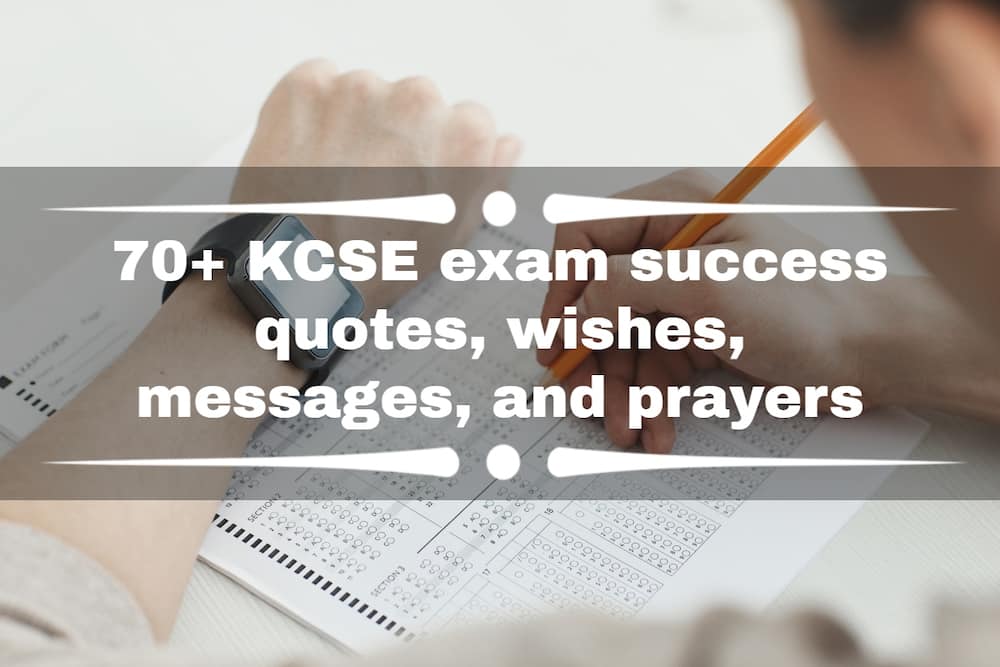
KCSE is one of the exams that places an individual to their desired fields of profession. Having one in your prayers and wishing them well as they sit for this crucial exam may be memorable for the rest of their lives. In addition, it reminds them of what is expected of them by everyone around them.
KCSE exam success quotes
When a loved one is waiting to sit for an exam, the message, wish, prayer or quote you send to them may be the trigger for them to do well. The initiative to jot something on their behalf means more than what is written. It is, therefore, significant to plan and decide what you want to write at such a time.

100+ best graduation captions to share on your Instagram
Success messages for exams
A beautiful message to a loved one as they sit for the exam reminds them of your care and concern during the exam period. Here is a collection of wonderful success messages for exams you can send to your loved ones.
PAY ATTENTION: Install our latest app for Android, read best news on Kenya’s #1 news app
- As you prepare for your exam, may excellence distinguish you amongst your contemporaries. May you shine above everyone else, and your efforts be rewarded with great success.
- I know how brilliant your mind is. I’m confident your performance will leave everyone in awe. All the best, my dear.
- You know more than everyone else because the testimony of the Lord is your meditation. So, as you prepare for your exam, approach it with confident assurance that success is yours. Good luck to you.
- I pray that you will be examined in the areas you are fully prepared for. May all things work together for your good in this exam. I am here to wish you the very best in the exam.
- May the Lord strengthen your hand in this exam and inspire you for extraordinary success. Smile, it shall be well; you have to emerge victoriously. Good luck.
- As you approach the national exam, I believe you will stay focused, determined and optimistic. I wish you the very best. You are in my prayers.
- I am aware that you are waiting for your exam. Don’t entertain thoughts of failure. Don’t give room to fear. Believe in yourself, and you will achieve. Great success shall be yours in Jesus name, Amen.
- As you approach the exam, believe that you are a victor. Put in your best as you have always done. Believe in your abilities, and victory will be yours.
- You will be doing your exam very soon. Just relax, take a deep breath, and you will conquer. Excellent success shall be yours because I know you are fully prepared. Keep your spirits high.
- It is essential to remind you that failure is not the portion of a child of God, especially one that has studied hard like you. You will shine excellently in Jesus name. You will be the head and not the tail.

Sweet graduation messages from parents to son or daughter

- Your KCSE is fast approaching. Just remain focused study smartly. The sky will be your stepping stone as you focus beyond it. Success shall be yours.
- Know that this exam will end in jubilation, and nothing short of success shall be yours. I can't wait to celebrate with you. I wish you the very best. You are in my prayers.
- This exam will make you the head and not the tail. You will be the first and not the last. So only keep your head high, your eyes focused, and your mind calm. Stay positive and believe that this exam will end in praise.
- I am confident that you are ready for the exam. I know what you're capable of, and I believe you can do this. I wish you the best.
- Put in your best like you always do. Believe in your abilities. Victory is undoubtedly yours.
- May success reward your diligence in the forthcoming exam.
- It's time to demonstrate your understanding of all that you have learnt. Then, receive the grace to do it well.
- Remain focused study smartly. The sky will be your stepping stone. Success shall be yours.
- I am confident that you will do us proud as always in this forthcoming exam. All the best.
- We all believe in you. You only need to believe more in yourself and work harder. We are banking on you to do us and yourself proud in this exam.
- It's not been an easy journey for you. However, I know you can do this if you want to. So make us proud dear one. Best wishes in your KCSE exam.
- Finally, the exam is here. The exam you have worked so hard for. Face it confidently. Tackle the questions expertly for your great success, is sure.
- The KCSE exam is not different from others you've written before. There is no need to be on edge. You have always studied hard and well. Go and do your best. Nothing but excellent success is yours.
- Success is not accidental. It comes to the prepared. So, as you do your KCSE exam, may your preparation meet with success. I wish you the best.
- May you be favoured by your exam and examiners. I hope all your efforts will be crowned with success. All the best in your exams.
- No one deserves success more than you. You have worked hard with resilience. May you be richly rewarded. Accept my best wishes for your exam.
- Don't panic; the KCSE exam tests what you already know. Stay calm. I wish you success all the way.
- Give that KCSE exam your best shot. It will be enough. Here’s wishing you the very best.
- As you approach your KCSE, believe that you can be anything you want to be. You only need to believe in yourself and trust God. Do your best, too, and success will be on you.
- Anything standing in the way of your success in the KCSE exam will be crushed. Impossibility is nothing. Go and achieve success.
- After this exam, you will have every reason to smile. The favour of the Lord will guide you to the correct answers. All the best
- You belong in the league of champions. There’s no stopping your shine for the KCSE exam. I wish you the very best.
- After working hard, you deserve a crown of victory. May success crown your efforts in this exam in Jesus' name.

80+ best success card messages for exams that will inspire anyone
KCSE success quotes
Many people find counsel in quotes. You may not explain the quote, but their message speaks volumes to your loved ones. You can use the following success quotes to wish a loved one well as they sit for their KCSE exam.
- Success means having the courage, the determination, and the will to become the person you believe you were meant to be, and nothing can stop you.
- The formula for success is rising early, working hard, working smart and striking the oil.
- Monetary success is not success. Career success is not success. Life, someone that loves you, giving to others, doing something that makes you feel complete and whole. That is a success. And it isn't dependent on anyone else but you!
- It's effortless to say what success is. Success is connecting with an audience who understands you and dialogue with them. It is continuing to push yourself forward creatively and not becoming a caricature of yourself.
- Success is a state of mind. So if you want success, start thinking of yourself as a success, and it will happen.
- Success has no shortcut, you have to learn the rules of the game , and then you play better than anyone else.
- Any man who reads too much and uses his brain too little falls into lazy thinking habits. Be the opposite.
- Success can never be defined by one sentence. It involves the whole person, and if you skimp on one area, you will limit your success.
- Success means doing the best we can with what we have. Success is the doing, not the getting, not the triumph in the trying. Success is a personal standard, reaching for the highest in us and becoming all we can be.
- Success is not the key to happiness. Happiness is the key to success. If you love what you are doing, you will be successful in the greatest of ways.
- Even though the world may write him down as a failure, the man who has done his best is already successful. Just do the best you can!
- You can't make any hits without any shots. Sometimes it takes a small risk to have a lot of great success. It should always be your number one priority before eating, sleeping and breathing. With success, everything else will follow!
- Success is a combination of thoughts, words, and actions. Success takes hard work, and it does not happen overnight! It takes continuance, endurance, and hard work.
- Success is neither magical nor mysterious. Success is the natural consequence of consistently applying the fundamentals, and yes, you get it!
- Success is blocked by concentrating on it and planning for it. Success is shy - it won't come out while you're watching. Won’t you go for it?
- People seem to gain wisdom more readily through failures than through successes. Everyone thinks of failure as the antithesis of success, but it isn't. Success often lies just the other side of failure. Don’t be everyone.
- Courage, wisdom, determination and lack of fear are what success wants us to be. Success is a woman and loves only a warrior.
- I don't know the key to success. But the key to failure is trying to please everybody. So you now know the key to success.
- If you are not willing to risk the usual, you will have to settle for the ordinary. You don’t belong to the ordinary.
- Good things come to people who wait, but better things come to those who go out and get them. The choice is yours.

Best congratulatory messages for graduation

- The whole secret of a successful life is to find out what is one's destiny to do and then do it.
- Knowledge is being aware of what you can do. Wisdom knows when not to do it and vice versa.
- Success is the sum of small efforts, repeated day-in and day-out.
- The only place where success comes before work is in the dictionary.
- People who succeed have a typical momentum. The more they succeed, the more they want to succeed, and they find other ways to succeed. Similarly, when someone fails, the tendency is to get on a downward spiral that can even become a self-fulfilling prophecy.
- Don't wait for it if you genuinely want something; simply teach yourself to be impatient.
- Successful people do what unsuccessful people are not willing to do. Don't wish it were easier, wish you were better.
- Most people never reach their goals because they don't define them or consider them believable or achievable. Winners can tell you where they are going, what they plan to do along the way, and who will be sharing the adventure with them.
- You must expect great things of yourself before you can do them.
- Success means knowing your purpose in life, growing to reach your maximum potential and sowing seeds that benefit others.
- To accomplish great things, you must act and dream, plan and believe.
- A man can be as great as he wants to be. If you believe in yourself and have the courage, the determination, the dedication, the competitive drive, and you are willing to sacrifice the little things in life and pay the price for the worthwhile things, it can be done.
- You measure the size of the accomplishment by the obstacles you had to overcome to reach your goals.
- You can never get success unless they have fun doing it.
- Never allow the fear of losing to be greater than the excitement of winning.

130+ most encouraging exam wishes for students to motivate them
Exam success wishes and prayers
Making a prayer for a loved one as they sit for the KCSE exam is a great way to remind God that you crave their success. Your wishes can also be accompanied by a special request for God to remember them. Here are exam success wishes and prayers you can use.
- May the grace of God come upon you to bring remembrance of all you have read and make you put down all that is expected of each question. Success is yours in Jesus name, amen.
- This is my exam success wishes and prayers for my love. I pray that you shall be leaping up for joy and gladness at seeing your results after this examination. I love you so much!
- It’s my prayer that you shall be endowed with the wisdom, knowledge and understanding for you to pass your exams with eminence and distinctions. You shall continually be in my prayers.
- May the Lord go with you as you enter into the exam centre, and may His grace to excel come upon you to do remarkably well. Success is yours in Jesus name, Amen.
- As you sit for the exam, May the favour of God be imprinted on your name and papers as they pass through for scoring to make you come out with flying colours.
- As you write this exam, my prayer for you is that you come out in all the flying colours of success. May the efforts you have put in shine radiantly. I wish you the very best.
- I bind every spirit of forgetfulness and confusion in your life in Jesus name. May you be blessed with a sound mind and good health. May all the correct answers come to you readily. My prayers are with you, and I wish you the very best in your exams.
- I desire your success as much as you do. That's why I keep praying to God to decorate your life beautifully and clothe you with excellence. May the guardian angels watch over you as you do this KCSE. All the best in your exams.
- I place you before God that has you go for this examination, may you not forget all you have read that is needed to be pen down, and your paper shall find favour everywhere it passes. May God be with you.
- In the name of Jesus, you shall be found highly favoured as you go for this examination. You shall write what is expected to be written for good marks. Success is yours in Jesus name.
- My prayers and best wishes in your forthcoming KCSE exam is nothing but victory.
- May the Lord crown your hard work with success in your exam.
- I pray that the Lord may remind you of everything you have learnt as you do the KCSE exam.
- What shall we render unto Jehova, for He gives you victory in your KCSE exam?
- My prayers are with you as you sit for your exam. I ask for more grace and favour in Jesus name.

- May the grace of the Lord Jesus Christ and the love of God accompany you to the exam room.
- The Lord is faithful and will give you success in your KCSE exam. Just trust Him.
- I pray for eternal favour in your exam. May all the answers flow under the Lord’s guidance.
- Success is yours in Jesus name. You shall achieve what no one has achieved, for the Lord is with you.
- You shall be called the greatest amongst all for your success in Jesus name.
- May the Lord watch over you as you sit for your exam. May He give you good health and a sober mind.
- Dear Lord, please remember this dear one as she waits for her exam. Reward her hard work greatly in Jesus name, Amen.
- May the Lord of all grace fill your mouth with thanksgiving after this exam.
- Father God, please crown lasting success to my dear ones in the KCSE exam.
- May the Lord make you the head and not the tail in the KCSE exam. Experience God’s greatness.
- You shall receive God’s favour in the coming exam. May He surprise you beyond measure.
- I wish you God’s blessings and mercies as you sit for your exam.
- May God, the rewarder of our efforts, supernaturally visit you as you sit for your KCSE.
- Father Almighty, please visit this dear one as he tackles the KCSE exam questions. Give him remembrance and sufficient grace to go through it.
- Those that trust in the Lord shall never be put to shame. Therefore, trust Him for your success in the KCSE exam.
- Your success shall marvel many. You shall conquer this very well. The Lord shall not leave you nor forsake you.
- May the Lord bless the work of your hands by giving you success in the KCSE exam.
- Dear Lord, watch your servant as he sits for the KCSE exam. Please grant him your grace and victory. Make him successful in Jesus name.
With the ideal KCSE exam success quotes, you can show your support. You can choose from a variety of messages and wishes, which are easily customizable. Make your pick and send them to your loved one through a gift card or a simple text message.
Tuko.co.ke shared an interesting article about the top 100+ happy Kiss Day quotes , messages, wishes, and SMS for him or her. Kissing is an integral part of a functional relationship. It breeds deeper romance between the lovers and strengthens the bonds of their love. It can help you ease unnecessary anxiety and unspoken pains.
Love has no boundaries. Once you have set your heart to love someone, then it is high time you started acknowledging what you feel for them through happy Kiss Day quotes and messages. Make his or her day a memorable one by sharing your heartfelt love quotes and messages for them.
PAY ATTENTION: Help us change more lives, join TUKO.co.ke’s Patreon programme.
Source: TUKO.co.ke

COMMENTS
Visualise a happy place - Close your eyes and imagine a place of safety and calmness. Allow the positive feeling to soothe you. Look at the evidence - Sometimes, fear crops up from non-existent things. Establishing facts helps to challenge fearful thoughts. Face the fears - Avoiding fairs makes them scarier.
3. Skip a line and write the salutation on the left-hand side. 4. Start a new paragraph as you begin to write the body of the letter. (keep rules of paragraphing) 5. The language should be friendly and familiar.The language depends on the relationship between the writer and the person he is writing to.The language must be: -easy to understand
Imagine that you are the guest of honor during your school's 100 years speech and prize giving day.Write the speech. ( 20 marks) 24. FUNCTIONAL WRITING ( 20 marks) Your uncle lives abroad. He is expecting five visitors from Kenya and would like to prepare for them a meal. Write an e-mail to him, providing a recipe of one of the favourite ...
Using powerful language. The language used in a speech should be interesting for the listeners. The acronym A FOREST is an easy way to make sure your language is powerful. It stands for: Watch ...
You have been selected to deliver a speech on Parent's day on behalf of other students. Apart from teachers, parents and students, there are several guests present as well as members of Board of Governors. You are expected to highlight the challenges facing students population in the school. Write the speech you would deliver. (20 mks)
of what to write about. Below are the beginning of compositions for various years in K.C.P.E. These and many other questions dictated how a composition should be written. However, one major factor in writing a composition is one's preparedness. Think critically on what you have to write about and list down the main points.
That is, the candidate is given a free hand to decide on what to write on. The 2006 KCPE composition required candidates to write on how they spent a school holiday. They could write on life in a farm, a visit of some relatives in town, a game park, or any other activity. The 2009 and 2010 composition have something in common in that they ...
These are some of the themes one can write on when given an open composition. It is however important to make sure that whatever you write on is smoothly connected with the beginning of a composition given. For example . The day I had been waiting for finally arrived.
1. In Kenya, this examination is the entrance qualification to public and private universities and the pass mark is grade C+. Students who attain a lower mark than C+ join other tertiary institutions for non-degree courses. Over time, stringent measures have been taken by the government to ensure and sustain the credibility of the KCSE examination.
We look at the content (subject matter and themes), organization and presentation (the structure, development and style used by composer and performers). Lastly we interpret the Oral piece in terms of its significance to the society. What lessons it teaches the society. How Oral Literature Relates to Society.
Create an outline: Develop a clear outline that includes the introduction, main points, supporting evidence, and a conclusion. Share this outline with the speaker for their input and approval. Write in the speaker's voice: While crafting the speech, maintain the speaker's voice and style.
FUNCTIONAL WRITING (20MARKS)You are the environment club chairperson in your school. You have been invited to give a speech on how to conserve the environmen...
Speech or talk. In a speech or talk you should: Address the audience directly throughout; Engage the audience in your introduction: Outline the topic; Use persuasive devices to hook the audience, such as rhetorical questions to get them thinking; Structure your speech logically, building your arguments persuasively:
When writing informal letters note the following: Your address is usually on the right hand side at the top corner of the paper. Do not write your name in the address since you will write it in the closing tag. You may use block or indented style in writing the address. The date is written one line below your address.
The best KCSE imaginative compositions score between 19-20 marks. Your composition must possess the following in order to fall under this category. Intelligibility-able to be understood (comprehensible) Correctness. Accuracy (devoid of errors) Fluency (communicates easily/very well/smoothly) Pleasantness.
To write an effective nomination speech, the candidate needs to outline what kind of person is right for the office and why he or she has those characteristics. If the candidate has experience or skills that give him or her an advantage, th..... Writing a recognition speech can be a daunting task. Whether you are recognizing an individual or a group, you want to make sure that your words are ...
Welcome to the comprehensive collection of KCSE English Questions for Form 4 students, specifically focusing on Oral Skills and Narratives. This resource is designed to aid students in their revision process by providing a diverse range of questions that cover key aspects of oral communication and narrative writing.
f) Study Writing: Descriptive essays, Argumentative essays, Expository writing, To help your learners perform well in KCSE imaginative composition, you should teach different types of writing and provide them with ample practice. You should also impress upon them that expository composition is concerned with linguistic
What is an investigative report? How can you write an investigative report and scoop all marks in KCSE English Paper 1? This video defines an investigative r...
3.1 Before you start writing the exam. As you enter the examination hall and find your seat take a good look at your surroundings. See where the clock is and check that the time it is showing corresponds to the time on your watch. There is nothing worse than being told that the exam finishes at 12.30 and then being told to stop writing at what ...
When planning, remember to: Underline key words from the question and blurb. Underline the audience you will be delivering your speech to. Decide on your "voice" and point of view. Write a one-sentence statement that summarises your point of view. Note down the points you can develop to support your point of view.
Summary - A summary will briefly recap the main parts of a speech. This lesson may benefit from being set up for a homework task where pupils write their speeches over the weekend. Alternatively, children could work in small groups to write a joint speech. Teacher tip. Licence.
Enjoy free KCSE revision materials on imaginative compositions, essay questions and answers and comprehensive analysis (episodic approach) of the set books including Fathers of Nations by Paul B. Vitta, The Samaritan by John Lara, A Silent Song, An Artist of the Floating World by Kazuo Ishiguro and Parliament of Owls by Adipo Sidang'.
Father God, please crown lasting success to my dear ones in the KCSE exam. May the Lord make you the head and not the tail in the KCSE exam. Experience God's greatness. You shall receive God's favour in the coming exam. May He surprise you beyond measure. I wish you God's blessings and mercies as you sit for your exam.
You have been selected to deliver a speech on Parent's day on behalf of other students. Apart from teachers, parents and students, there are several guests present as well as members of Board of Governors. You are expected to highlight the challenges facing students population in the school. Write the speech you would deliver. (20 mks)